



































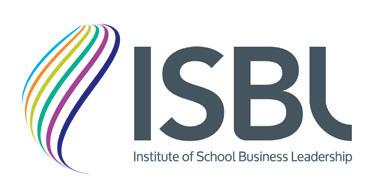



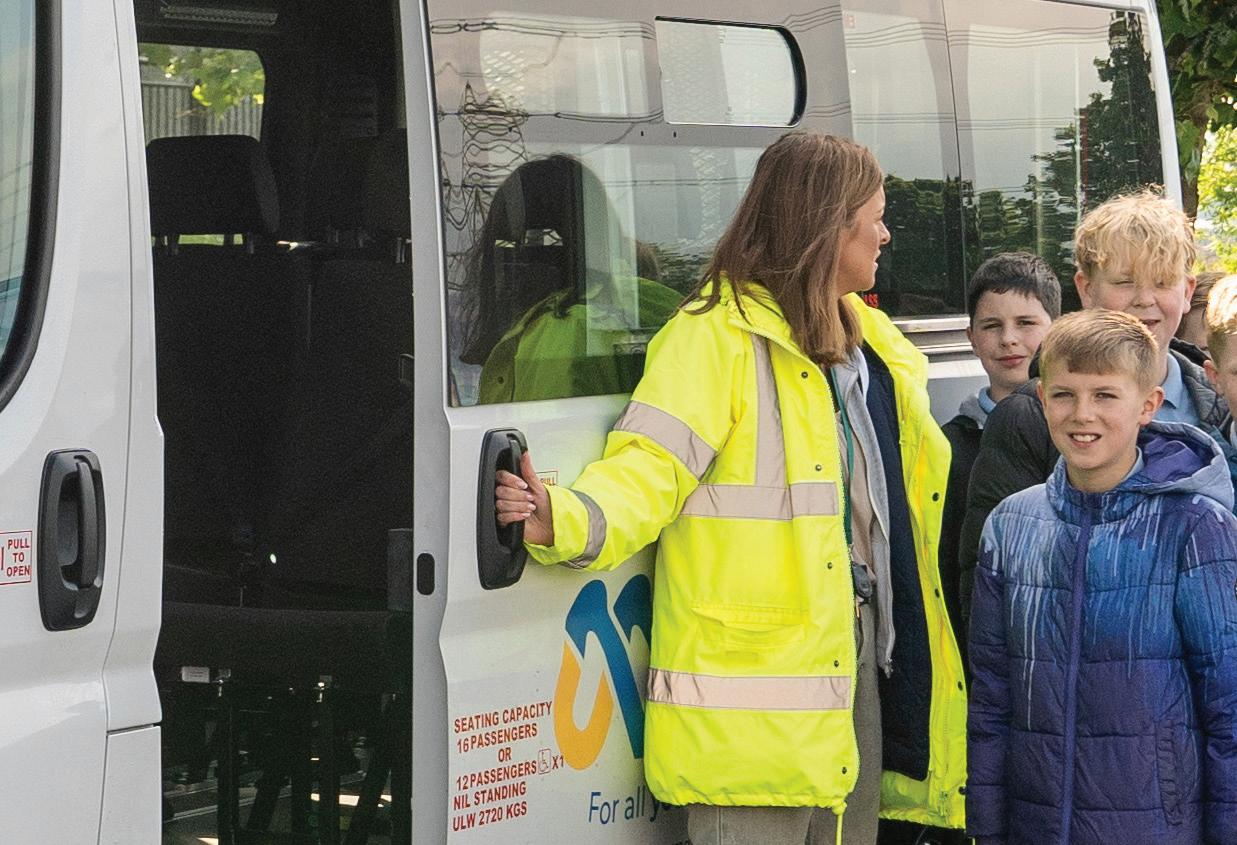










































































Academy21 provides DfE-accredited online education for students who may be vulnerable or face challenging circumstances.
Working in partnership with schools and local authorities we ensure our students have a calm, structured and consistent learning environment, as well as expert academic and wellbeing support. Our trauma-informed approach prioritises safety, predictability, and relationshipbuilding helping students to regain confidence and re-engage with learning.
Our programme at a glance
High-quality provision for Years 5 to 11
Experienced, subject-expert, compassionate teachers
Quick set-up and flexible commissioning options
Support for Internal AP, hybrid learning and part-time timetables










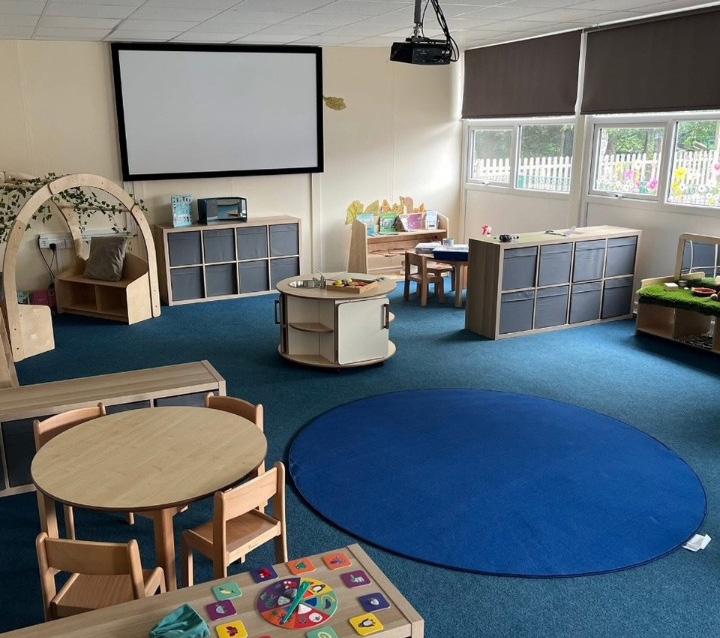










Keep Fire Doors Safe, Accessible and Compliant. DorMag by Fireco – Magnetic Door Retention Made Simple.
DorMag is a smart, easy-fit magnetic door holder that keeps fire doors open safely and releases them in an emergency. It’s ideal for hospitals, surgeries, and care settings where access, airflow and compliance are critical.

Helps with infection control – reduces door contact
Fire safety compliant (BS 7273-4)
Quick to install with mains or battery power
Improves access for staff, patients and equipment
Stay compliant, reduce risks and make movement easier with DorMag.



I am so proud of this product and excited by the reception it has already received. When you delve down into the technology it’ll soon become clear how DorMag has taken door magnets to the next level.
James Cox, Head of
Sales UK

A new Education Committee report calls for a “root and branch” transformation of the way mainstream education caters to children and young people with special educational needs and disabilities (SEND).
It says that SEND must become an intrinsic part of the mainstream education system, rather than an addition to it, after MPs witnessed examples of good practice in English schools and abroad.
Embedding inclusivity in all education settings, from early years through to post16, and identifying needs early in a child’s education, will enable support to be provided in the mainstream.
The report says that the government must therefore invest in the skills of all current and future school staff, making SEND the responsibility of the whole school.
This cultural shift would then calm the rising need for complex, costly education health and care (EHC) plans in the long-term, and help put schools and local authorities’ finances on a sustainable footing.
The cross-party committee calls on the government to invest in both the education and health services’ workforces, to ensure that the health service steps up to its role in solving the SEND crisis, and to improve collaboration between the two sectors...

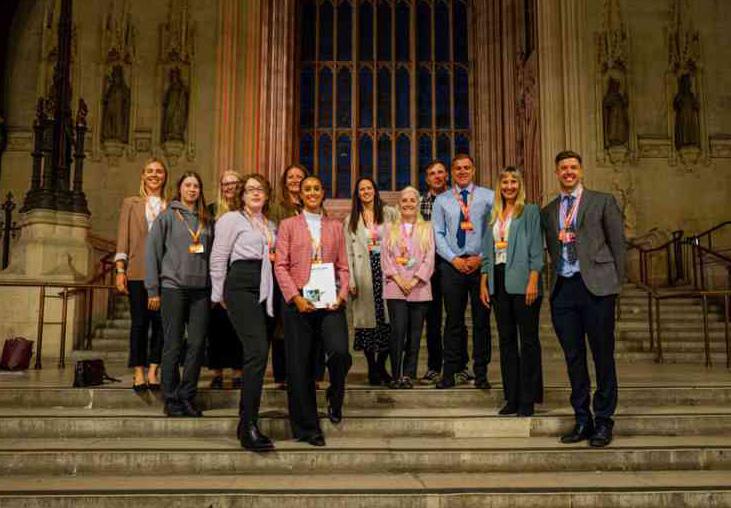
YOUNG CARERS
A new report has been released which shines a light on the challenges young carers face in England’s education system, focusing on their disproportionately high rates of suspensions, exclusions, and referrals to Pupil Referral Units (PRUs) compared with non-caring peers.
The report, written by charity MYTIME’s Level Up Academy lead Shakira Bryan, was presented at the Houses of Parliament and was hosted by Bournemouth East MP Tom Hayes, who has spoken openly about his own childhood experiences as a young carer.
Combining national data with lived experiences and case studies, this new report highlights systemic barriers that drive disengagement and calls for more inclusive, responsive approaches in schools and policy.
The report launch was attended by a diverse audience of researchers, educators, representatives from charities, and policymakers including representatives from Ofsted as well as Members of Parliament and of the House of Lords.
In opening remarks, Tom Hayes MP reflected on his personal experience of care, the importance of support systems for young carers, and the significance of bringing the report’s findings to light.
Tom Hayes MP said: “As someone who grew up caring for my disabled parents, I know how easy it is for young carers to feel overlooked. That’s why MYTIME’s work matters so profoundly – and why it meant so much to welcome them, and some of the young ...



Visual Campus Across-site display communication for your entire education establishment.
From schools through to colleges and universities, Philips Visual Campus delivers on any display demand. For any location – inside the classroom, throughout your buildings, and around the grounds. A truly connected display solution for every educational setting.
Of course, your learning spaces are at the heart of your establishment. From classroom TVs through digital signage to interactive and collaboration screens, Philips education displays bring state-of-the-art solutions that support and improve teaching and learning.
And extending the experience throughout your setting, the trusted quality of Philips Professional Displays delivers so much more. From creative videowalls for your reception or giant dvLED for sports facilities and theatres. Clever wayfinding around campus, digital menu boards in the canteen, or cutting-edge TVs for your student dorms. You will find it all covered with Philips Visual Campus.


Almost half of senior school leaders across the UK say they feel burned out “often,” according to a new survey by the Universities of Warwick and Nottingham, supported by the Economic and Social Research Council (ESRC) through its ESRC Education Research Programme.
Over 1,600 school leaders across England, Scotland, and Northern Ireland participated in the survey, providing a detailed examination of how UK leaders allocate their time, manage their responsibilities, and make decisions about remaining in the profession.
The majority of their time is consumed by administration, safeguarding, staffing, and compliance, leaving little opportunity to focus on curriculum development or teaching improvement. Alongside these demands, staffing issues and financial constraints are placing severe strain on wellbeing, even for those who report feeling effective and purposeful in their roles.
Challenges around Special Educational Needs and Disabilities (SEND) provision and inclusion emerged as one of the most draining factors, alongside poor worklife balance and the sheer the weight of leadership responsibilities. Yet, despite these pressures, leaders cite their relationships with pupils and collaborative work with colleagues as crucial sources of motivation, underscoring the commitment that sustains the profession under increasingly challenging conditions.
Leaders in Scotland reported the greatest ...


LocatED, the government’s school building body, will move into the Department for Education by April 2026.
The integration will combine LocatED’s commercial property expertise with the Department for Education’s understanding of what schools need, whilst delivering maximum value for taxpayers.
This move follows the Cabinet Office review of all Arm’s Length Bodies across government announced in April 2025.
LocatED was established in 2017 to support the delivery of education settings across England including buying, developing, and managing sites for schools and colleges as well as strategic property advice to government and education bodies to help build a more efficient education estate.
This move will bring LocatED’s property expertise directly into the Department for Education, creating a unified approach to managing and developing the education estate. Department for Education Permanent Secretary, Susan Acland-Hood, said: “LocatED will bring commercial property expertise into the heart of the Department for Education to help us manage and transform the education estate, make it sustainable, give great value to the taxpayer, and support excellent outcomes for children and young people. I’m delighted to be welcoming LocatED colleagues even more closely into the Department...
DreamBox Reading Plus and DreamBox Maths can help!
Daisy Education helps students thrive through its online adaptive development programmes:
DreamBox Reading Plus - improves reading fluency, vocabulary and comprehension.
DreamBox Maths - builds confidence and core maths skills with proven, adaptive learning.

“The impact is self-evident. Every teacher wants the best for their children and Reading Plus helps us provide that.”
Kieran Roberts Deputy Head at St Elisabeth’s CE Primary School
“DreamBox Maths has had the most impact we’ve ever seen from a maths programme.”
Nichola
Clark Principal at Hill Top Academy

Click here to book our extended 6-week free trial for September
Try our award-winning programmes at no cost, so you can see the impact on your students’ progress and confidence.
Formerly known as
New research reveals that 57 per cent of lowincome families say their child struggles to access devices or reliable internet outside school, severely impacting their education.
For over a third of parents (34 per cent), schools simply assume this access exists, which could potentially widen inequality.
The research from RM Technology and the Digital Poverty Alliance was released on the third ‘End Digital Poverty Day’. It shows that one in eight children (12 per cent) rely on smartphones to complete schoolwork, devices which are completely ill-suited for learning, while 15 per cent must share a single device with siblings or parents.
Worryingly, 11 per cent have little or no internet access at home, making remote learning almost impossible. Teachers are witnessing the consequences, with 75 per cent reporting pupils falling behind due to poor home access and nearly a third (31 per cent) noting a lack of basic digital skills among their students.
The long-term costs are immense, say the Digital Poverty Alliance. Closing the UK’s digital gap could unlock £17bn in annual earnings, deliver up to £6bn in better financial management and save nearly £1bn in government spending. Yet, right now, children without reliable devices or internet are falling behind their peers, teachers are struggling to deliver inclusive learning and schools are forced to diverse scarce resources to plug the gap...


TechSkills’ Lorna Willis
Lorna Willis, CEO of TechSkills, techUK

The UK’s skills agenda is at a pivotal and exciting juncture. Departments from DSIT to DfE and DWP are issuing new initiatives at pace, from AI training funds to apprenticeship reforms and employability pilots. Whilst this activity signals strong intent, for employers and training providers, the growing number of schemes can sometimes feel more overwhelming than empowering.
The establishment of Skills England was a welcome step towards greater clarity. Its purpose is to offer a unified framework to guide government, industry, and providers. The recent publications is an encouraging sign of progress. However, several foundational questions remain unanswered: How will priorities be sequenced? How will delivery be coordinated across departments? And how will success be measured in terms that employers trust and learners understand?
In the absence of clear answers, uncertainty persists. Providers face challenges in long term planning, learners encounter a fragmented system, and employers struggle to align their investments with evolving government priorities.
Skills England could become the body that delivers coherence and confidence, but it must move beyond consultation into practical direction. If we are serious about addressing shortages and driving growth, the sector needs more than policy papers, it needs a clear and credible plan for implementation. www.techuk.org




At RDUK, we believe technology doesn’t need to be disposable. Every laptop and desktop can be renewed, remanufactured, and given a second life — delivering top performance, big savings,and measurable sustainability benefits.
From our 10,000 sq. ft facility in Strood, Kent, we fully remanufacture businessgrade devices to exceed the standards of new. Every unit is dismantled, rebuilt, upgraded, and tested to BSI Kitemark accreditation — giving you reliability you can trust, at up to 40% lower cost than buying new.




















Why Choose RDUK?


• Performance guaranteed: Windows 11 compliant, enterprise-grade hardware.
• Sustainable by design: Each device prevents e-waste and avoids unnecessary CO₂ emissions.
• Inclusive options: SEN-friendly keyboards, branded lids, and tailored set-ups.
• Assurance built in: Two-year standard warranty, with options for three or five years. 01634 297500


The number of eligible children taking up the offer of free school meals in Scotland has increased for the second year running, according to the latest statistics.
More than two thirds of those eligible (67.7 per cent) were able to benefit from a school meal in 2023-24, up over three percentage points on the previous year (64.3 per cent).
In August 2025, the free school meals programme was extended to 6,000 high school students in S1 to S3, backed by £3 million from the Scottish Government. This trial phase is for those in receipt of the Scottish Child Payment who attend selected schools in eight local authority areas, and takes the number of pupils being offered free school meals in Scotland to over 360,000.
Cabinet Secretary for Education, Jenny Gilruth said: “We know how important it is for children to have access to a healthy meal during the day, and the role that nutrition plays in supporting their ability to concentrate, thrive and learn. It’s promising to see the number of pupils benefiting from a free school meal increase for the second year in a row, though it perhaps also reflects the pressures that families are experiencing, particularly in relation to food costs.
“That is why providing and expanding free school meals remains a crucial element of the Scottish Government’s commitment to eradicate child poverty and I would encourage all families who are eligible for free school meals to take up the offer available to them.”


ATTENDANCE
Schools told to be ‘proactive’ with pupils missing education
The Department for Education has updated its Children Missing Education (CME) guidance, which places greater responsibility on leaders to monitor attendance, act swiftly on concerns, and work closely with local authorities to locate and support missing pupils.
Under the rules, which are now statutory for schools as well as local authorities, schools must closely monitor attendance through their registers and act early to address poor or irregular attendance, helping prevent pupils from becoming classified as CME. Where patterns of absence emerge, schools are expected to refer concerns to local authorities at intervals agreed by both parties.
If there are any safeguarding concerns about a child’s wellbeing, the guidance stresses that schools must take action immediately. Staff should follow their child protection policies and, where appropriate, involve the designated safeguarding lead, children’s social care, or the police.
Schools are also expected to take the lead in making initial efforts to locate children who may be at risk of becoming CME before escalating the case to the local authority. Even once a case is handed over, schools must continue working with councils to conduct joint enquiries and support a child’s return to education...



More children and young people in Scotland than ever before are being educated in schools in good or satisfactory condition.
The latest statistics show the proportion of pupils learning in schools in good or satisfactory condition has increased to 92.5 per cent, up from 92 per cent since 2024.
Since 2019, 14 new schools have opened to pupils as part of the Scottish Government’s £2 billion Learning Estate Investment Programme (LEIP). In 2024-25 alone, 17 school builds or substantial refurbishment projects were completed – 15 primary schools and two secondary schools.
Commenting, Education Secretary Jenny Gilruth said: “All pupils deserve to learn in modern schools that give them the best possible opportunity to maximise their learning. These statistics show our ongoing and significant investment in the school estate continues to deliver. The proportion of schools reported as being in “good” or “satisfactory” condition has increased to 92 per cent (91.7 per cent in 2024), compared to 62.7 per cent in 2007, when this Government first came to office.
“Through the £2bn LEIP investment, a further three school projects are expected to be completed this year, and we will continue working with COSLA, councils and the Scottish Futures Trust to maximise future improvements in the school estate.”


SCIENCE
Teachers warn of difficulties with practical science lessons
Science teachers are struggling to deliver practical lessons – and could face the problem of lab technicians leaving the profession. This is according to a survey of almost 2,000 science teachers and technicians by the Royal Society of Chemistry. They reported that insufficient time (58 per cent), challenging student behaviour (48 per cent), and the cost of consumables and chemicals (43 per cent) were the biggest challenges to delivering practical science lessons.
Science technicians are vital in the provision of practical work in schools. Yet the same survey found nearly a fifth (19 per cent) of technicians intend to leave the profession by 2027 and a further 39 per cent are unsure whether they will stay in the job. Aside from retirement, low pay (72 per cent), lack of progression opportunities (67 per cent) and high levels of stress and exhaustion (44 per cent) were the key reasons cited for leaving. In 2023, 17 per cent of UK technicians cited high levels of stress and exhaustion as a reason for leaving their role – a 159 per cent increase in just two years.
Science teachers said that losing science technicians would have a detrimental impact on students’ learning outcomes, while 29 per cent of survey respondents cited understaffing of technicians as a barrier to delivering practical work. One teacher in England noted...
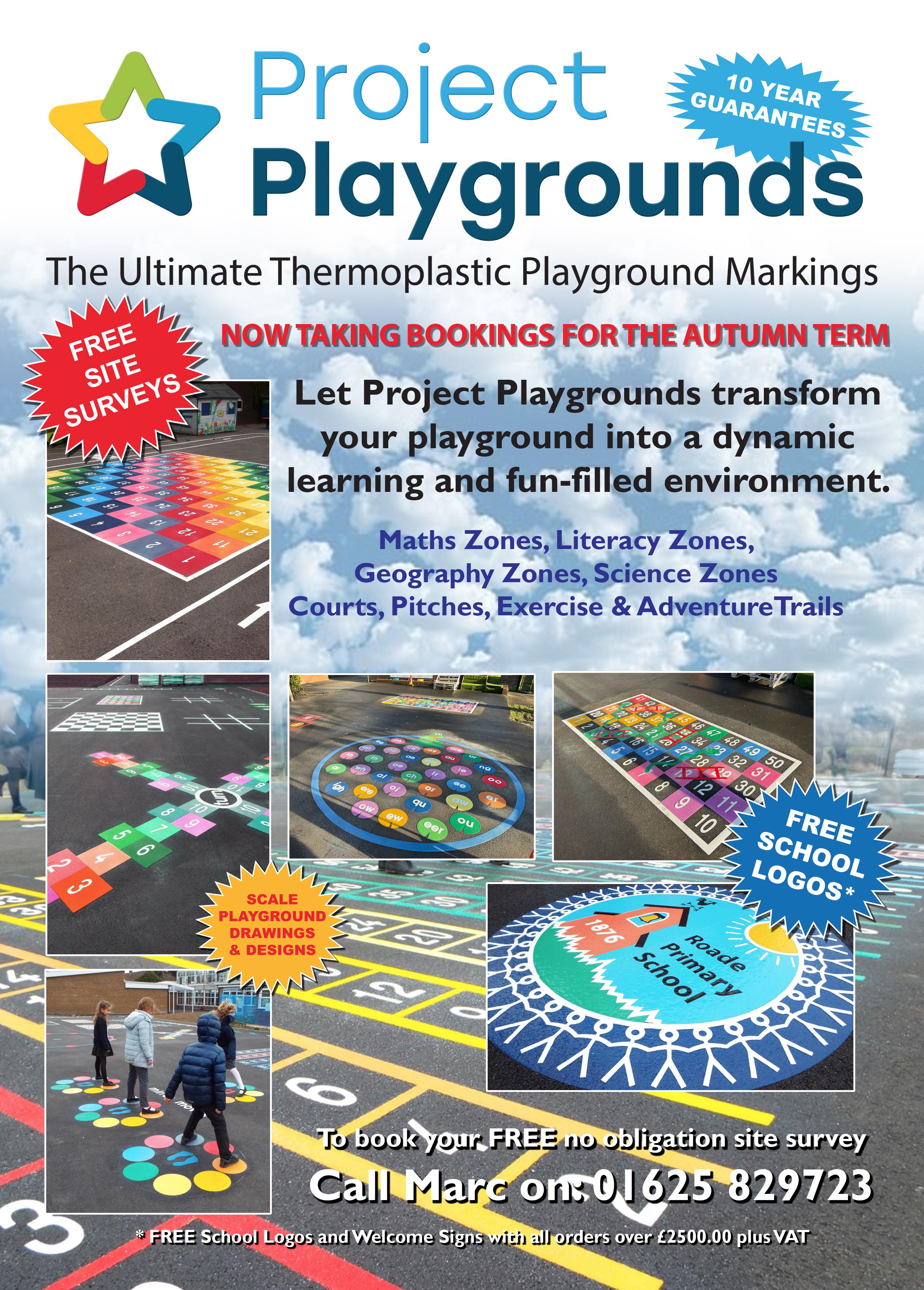

The government is nearly doubling the amount of schools to receive support from its school improvement experts, called Rise teams – to reach to 377 schools and almost 100,000 more children.
Made up of 65 advisers with success in driving school standards, the teams are now due to reach more than 200,000 children in total, working with ‘stuck’ schools that have received consecutive poor Ofsted judgements.
Later this term, the government will consult on how these teams could directly support schools with the lowest levels of attainment, recognising the need to go further and faster to raise standards for pupils.
The Department for Education has also announced it will launch an online platform that will enable head teachers to benchmark their school’s performance against other, similar schools – for example by size or deprivation levels.
The tool will show heads their school’s strengths and weaknesses across key metrics, including attainment, compared with their peers while also enabling collaboration to share best practice. Testing begins this academic year and builds on the success of the government’s AI-powered attendance reports, which already helps heads identify where they’re falling behind and how to catch up...

Census shows schools plugging gaps as support services fail: READ MORE
£45m nursery expansion targets schools in deprived areas: READ MORE
Centre for Teaching Excellence opens in Scotland: READ MORE
New Education Committee inquiry into early years sector: READ MORE
Summer term unauthorised absence rates drop: READ MORE
More than half of RAAC-affected schools and colleges are either fully free of the substance or are in the process of having it removed, the Department for Education has reported.
Fifty two of the schools with targeted grant funding have had RAAC removed, and a further 71 schools with RAAC are in the process of being rebuilt under the School Rebuilding Programme.
Education Secretary, Bridget Phillipson, said: “High-quality classrooms show every child that their education matters – and that their future matters to this government. We are repairing the fabric of our schools and restoring the pride pupils feel in their classrooms.
“As part of our Plan for Change, we are delivering the largest school improvement programme in a generation – moving beyond short-term fixes to create lasting benefits for pupils, teachers, and communities.
“After years of neglect, we inherited a school estate in urgent need of repair. Now, with unprecedented long-term investment, we are breaking down barriers to opportunity and building schools where every child can thrive.”
All affected schools have measures in place whilst permanent removal of RAAC continues, ensuring education is kept running.



Applicant Tracking System
Automate and centralise your entire hiring journey

Speed up recruitment, cut down time-to-hire

Drive measurable success with key insights

Stay fully compliant with KCSIE and GDPR built-in
Job Board
Advertise on the largest education-only job board

Engage 2 7m+ education professionals

Target specialist talent and leadership roles

Double candidate application rates



Digital Marketing
Leverage high-impact platforms and expertise
Reach passive talent on targeted media channels
Attract Gen Z educators active on social media
Adopt a low-cost multichannel approach
3-5 hrs admin time








Education Business magazine’s pick of the fifty most influential people making an impact on education

Now in its fourth year, the EB50 Most Influential is our pick of the fifty most impactful people shaping the education landscape

Welcome to the EB50 Most Influential –our annual spotlight on 50 individuals who are making a significant difference in the world of education.
Now in its fourth year, the EB50 list recognises those who are driving change and inspiring progress across the sector. From classroom practice and curriculum development to assessment, governance, funding, safeguarding, policy, training, teacher wellbeing, and school leadership – these individuals are helping shape the way education is delivered.
This year’s list features a diverse mix of sector leaders and changemakers, including current and former teachers, union voices, MAT executives, government bodies, charity heads, and association leaders. Each has played their part in influencing how schools operate, how educators teach, and how students learn – all while tackling the sector’s biggest challenges with the goal of helping every pupil thrive.
A big congratulations to everyone featured. If you’d like to nominate someone for next year’s list, please get in touch: angela.pisanu@psigroupltd.co.uk

50 NEW Nathan Atkinson co-founder of Rethink Food
With over two decades as an educator including as headteacher of a large inner-city primary school, Nathan witnessed firsthand how hunger halts learning. In response, he co-founded Rethink Food in 2018, which now supports more than 700 schools across the UK, delivering thousands of hours of health and foodsecurity education. Nathan’s innovative work, which also includes providing universal breakfasts and community cafés in schools, has influenced policy conversations about embedding food education into the national curriculum.


49 Jo Marchant advisor and school estates professional
Jo Marchant MBE is a highly respected expert in school business operations, with experience across both mainstream and special education settings.
In 2022, Jo joined the steering group of The Trust Network, where she contributes to quarterly discussions with the Department for Education on key guidance, including the Estate Management Competency Framework. In recognition of her outstanding contribution to education, Jo was awarded an MBE in the King’s Birthday Honours List in June 2024.

48 Ross Morrison McGill founder and CEO, Teacher Toolkit
A passionate advocate for the teaching community, Ross runs a widely respected education blog that shares practical resources, challenges policy, and amplifies the voices of classroom teachers. Ross has over 20 years of experience as a classroom teacher and now works with schools to improve teaching, reduce workload and support teacher wellbeing. His influence recently earned him an invitation to 10 Downing Street to meet the Education Secretary and discuss strategies to break the link between a child’s background and their future.


47 Emma Balchin chief executive, National Governance Association (NGA)
Emma brings over 25 years of experience in education, leadership and school improvement, with extensive knowledge of both maintained schools and academy governance. Championing the importance of governors and trustees, which she describes as the “quiet backbone” of the school system, Emma also sits as a governor within a MultiAcademy Trust. In her role at the NGA, Emma works to ensure the organisation remains responsive to the evolving needs of the sector.

46 Caroline Wright director general, British Educational Suppliers Association (BESA)
Caroline Wright is the director general of BESA, the UK’s national trade association for educational products and services. Representing over 400 member companies, BESA ensures rigorous standards are met to give schools confidence in what they’re buying. Caroline also leads EdTech Exchange, Europe’s largest network for EdTech founders. Before joining BESA in 2012, Caroline held senior communications roles across multiple UK government departments, including the DfE, Ofsted, and the Cabinet Office. She has also co-chaired the Department for Education’s EdTech Leadership Group.

45 NEW Emma Hollis CEO, NASBTT
Emma Hollis is CEO of the National Association of School-Based Teacher Trainers (NASBTT) which promotes high-quality schools-led programmes of training, education and professional development of teachers. Previously Head of ITT for a school-centred ITT provider, then head of teaching school and subsequently head of education strategy for a newly-formed MAT, Emma has worked closely with NASBTT since 2016 when she joined the Management Team. She took up the role of Executive Director in 2017, becoming CEO in 2024.

44 Amanda Wilson headteacher, St Alfege with St Peter’s CofE Primary School
Amanda Wilson is an inspiring education leader with over 25 years of experience in teaching and school leadership. Known for her dedication to developing future leaders, she has supported countless teachers on their journey into leadership roles. Since becoming a headteacher in 2019, Amanda
has continued to champion diversity in education, publishing a book that aims to empower and inspire the next generation of black school leaders. In recognition of her impact, Amanda received the 2024 EB Leadership Award in the Primary sector and was recently awarded an Honorary Fellowship by the University of Cumbria.

Ian is a highly experienced executive leader, with a strong track record of supporting school and trust leaders to drive meaningful improvement. Over his career, he has played a pivotal role in raising standards across the education sector. His previous roles include five years as a Senior His Majesty’s Inspector at Ofsted and four years as CEO of a multi-academy trust, where he led strategic development and school improvement at scale. Ian now works closely with the Fairfax Multi Academy Trust executive team and school leaders, providing strategic advice and support to help them realise their vision.


A respected sector expert and thought leader in education and EdTech, the former CEO of United Learning is widely recognised for his strategic insight and national influence. He is regularly invited to contribute to government, academic, and industry initiatives focused on educational technology and school improvement. Now serving as chief executive of IAPS (Independent Association of Prep Schools), he continues to advocate on behalf of the independent sector.

Dr Fiona Aubrey-Smith is an awardwinning educator, leader and academic, recognised in 2024 as one of the Top 5 Visionary Women in Education. With a deep commitment to supporting those who work with children and young people, Fiona is the Founder of PedTech and Director of One Life Learning, where she collaborates with schools, trusts, professional development providers and EdTech organisations to enhance teaching and learning. She also serves on the boards of various multi-academy and charitable trusts, is the author of From EdTech to PedTech, and sits on the DfE’s EdTech Evidence Advisory Board. E


40 David Thomas chief executive of Axiom Math
David Thomas is CEO of Axiom Maths, a charity focused on improving maths education for all. He previously co-founded Oak National Academy, the online learning platform for schools, which is now a government arms-length body. Thomas is also a former maths teacher, secondary school headteacher, and government advisor on education policy for the DfE.

39 Professor Simon Peyton Jones chair of computing at school (CAS) and NCCE
Professor Simon Peyton Jones is a prominent figure in computer science education, known for co-founding Computing at School (CAS), the association for computing education in the UK, and his involvement in the National Centre for Computing Education (NCCE). He played a key role in the 2014 reform of the English computing curriculum, which established computer science as a foundational subject for all students.

38 NEW Jon Hutchinson director of Curriculum and teacher development, Reach Foundation
Jon Hutchinson is an experienced educator, dedicated to creating a system where every child can thrive and lead a life of opportunity. He began his career as a youth worker supporting children with complex cardiac conditions before training as a teacher and rising to senior leadership in an all-through school. Jon has served as an expert advisor to the DfE, contributing to the Early Career Framework, and currently sits on the government’s curriculum and assessment review panel. He played a founding role in Oak National Academy, contributing over 75 lessons and leading its first primary humanities team. Jon is also co-founded Meno Academy, an online platform that provides short subject knowledge videos for primary school teachers.

37 Professor Mick Waters author, educationalist
Former head teacher and director of the Qualifications and Curriculum Authority, Mick Waters has worked in education, both at classroom and policy levels, for decades. He has worked to develop revised policy and practice for leadership, teacher education, governance and classroom teaching. In 2022, he published ‘About Our Schools: Improving on previous best’, with Sir Tim Brighouse.

36 Annamarie Hassall MBE chief executive, Nasen & chair of Whole School SEND
Annamarie Hassall MBE is the chief executive of nasen, a charitable organisation that supports and champions those working with SEND children. She is also chair of Whole School SEND, the Department for Education’s universal SEND services programme. Annamarie has a wealth of experience in children’s services, with a career that started in children’s residential and social care. She then worked as an early years specialist in local government before moving to an advisory role for the DfE, followed by the private sector, where she successfully delivered national programmes on behalf of government.

35 Alex Quigley national content manager, Education Endowment Foundation (EEF)
Alex is head of content and engagement at the Education Endowment Foundation (EEF) where he ensures content meets the needs of school leaders and teachers. He also leads the EEF’s school engagement function, listening to the profession to understand their pressures and priorities. A former English teacher of 15 years, Alex is also the author of books including ‘Closing the Vocabulary Gap’ and ‘The Confident Teacher’.

34 Daisy Christodoulou director of education, No More Marking
Daisy is director of education at No More Marking, a provider of online comparative judgement software for schools, which has recently created a product using AI to deliver efficient essay marking, personalised feedback and insights into narrative and analytical writing balance. Before this, she was head of assessment at Ark Schools. Having developed evidence-based practices that have made a big impact in the classroom, she is also the author of three influential books about education: Teachers vs Tech, Making Good Progress, and Seven Myths about Education.


33 Sir Michael Wilshaw associate director, Academicis
Sir Michael has a long and prominent career in the education sector, with a focus on improving the schooling system so children can thrive. He served as Ofsted’s Chief Inspector from 2012 to 2016 and was a teacher for 43 years, with 26 of these as a headteacher. Now he is associate director at Academicis, a school leadership recruitment company.


Having originally trained as a teacher in Teach First’s inaugural 2003 cohort, James’ long career in education has given him a strong understanding of the challenges faced by teachers and pupils and a clear vision of the actions needed to better support them. James was named CEO of Teach First in February 2025. Previously he was CEO of Ambition Institute and its predecessor Teaching Leaders. He is also the Chair of Orion Education, a multi-academy trust.

Recently appointed on the Department for Education’s new academy trust CEO advisory group, Tom Campbell has over 20 years in the education sector. He is CEO of E-ACT, a multiacademy trust of 39 schools and was previously chief education officer at Greenwood Academies Trust and principal at Fullhurst school in Leicestershire. Tom has a track record of transforming schools, nurturing staff and embedding an “improvement mentality” in each person.

Stephen has a vision for a professionalised workforce of school business leaders. In 2015, he instigated the development of professional standards that are now nationally recognised and feature in the Academy Trust Handbook. Stephen has continued to lead ISBL in its work with the Department for Education, supporting more than 10,000 school business professionals to gain formal qualifications and flourish in the profession.

Rebecca is a highly experienced education leader with a strong track record across both school improvement and system leadership. Before joining Lift Schools, she served as director of secondary at Ark Schools, and prior to that, held a senior government role as the Regional Schools Commissioner for South-West England at the Department for Education. She has also held leadership roles at Oasis Community Learning. Rebecca is also a member of Council at the University of Exeter, where she chairs the Academic Governance Committee, and serves as a trustee for Ambition Institute. She was also chosen as one of the leaders in the DfE’s multi-academy trust CEO advisory group.

Tom Bennet ran the Department for Education’s Behaviour Hubs project, which has recently concluded, having supported over 650 schools and academies. He is also founder of researchED, a grass-roots organisation that raises research literacy in education. Tom has written four books about teacher training, and in 2015 he was long listed as one of the world’s top teachers in the GEMS Global Teacher Prize. His online resources are a valued resource in the education community.

27 Amanda Allard director, the Council for Disabled
Amanda uses her 30 years+ experience working in children’s policy to shape her work as Director of the Council for Disabled Children, where she is determined to help frontline services ensure disabled children achieve their aspirations and not feel excluded. Amanda is a member of two external reference groups advising Ofsted on behaviour, attendance and inclusion, as the organisation embarks on wide-ranging reforms.

26 Frank Norris education advisor, Northern Powerhouse Partnership
A respected commentator on the education landscape, Frank has spent over four decades in education positions, including teacher, two headships, as well as a period at Ofsted where he was instrumental in developing detailed grade descriptors to support more consistent judgement making. He was director of the Co-op Academies Trust and oversaw the number of academies growing to 23. He is advisor to the Northern Powerhouse Partnership and a trustee and chair of finance at the Great Academies and Education Trust.


25 Dr Patrick Roach former general secretary, NASUWT
Having worked at NASUWT since 1998, Dr Patrick Roach has recently stepped down as the union’s general secretary, a position he held since 2020. He spent his career fighting for teachers’ rights and working hard to end the injustice of racial inequality within the school workforce. Patrick has recently been awarded CBE in the King’s Birthday Honours for a lifetime of service to education. E


Hilary leads the work of the Ambition Institute, which helps educators to continuously improve so that the education system can ensure that every child thrives, whatever their background. Hilary has held a range of senior positions in the Civil Service, including more than a decade at the Department for Education. She is a school governor, and helped set up a secondary school in Lambeth.

Former NEU leader Dr Mary Bousted now chairs the Teaching Commission, which seeks to find solutions for the government to solve the recruitment and retention crisis, and ensure teaching remains an attractive profession. It seeks to explore the causes of excessive workload and how schools can promote flexible working. The Teaching Commission’s recent report calls for the establishment of an “expert teacher” role, which would reward and retain staff who want to further their careers but stay in the classroom. It has also called for the teacher pay review body to have a widened remit.

Emma is a respected curriculum expert, currently leading the design of the curriculum at Oak National Academy – an independent public body to support teaching. She is an experienced teacher and school leader and is working for the Department for Education as ITT specialist curriculum associate. She has also recently published a new booked called Secondary Maths in Action and is a sought-after speaker at industry events.

Peter Hyman has a string of education improvement achievements to boast about. He was co-director of Big Education, a new organisation set up to change the story of what matters in education. He was the co-founder and first headteacher of School 21, a pioneering 4 to 18 years school that opened in Stratford, East London in 2012, and also co-founder of Voice 21, a social enterprise developing speaking skills in young people. For nine years to 2003, Peter worked as a strategist and speechwriter to the British Prime Minister, Tony Blair. He left to become a teaching assistant in a challenging Islington school, before training as a history teacher and working his way up to become a headteacher.

20 NEW Pepe Di’Iasio ASCL general secretary
In his role as general secretary for the school leaders union ASCL, Pepe has tasked himself with producing a better settlement for education so that schools and colleges have the funding and staff they need to produce successful educational outcomes. Pepe has previously been an executive headteacher of two schools and served as assistant director of education in Rotherham.

19 Anne Longfield CBE founder, Centre for Young Lives
Anne is founder and Chair of the Commission on Young Lives, an independent think tank dedicated to improving the lives of children, young people and families, and was Children’s Commissioner for England from 2015 to February 2021. She is a passionate champion for children, influencing and shaping the national debate and policy agenda for children and their families. She has recently been working with organisations within Lincolnshire and Yorkshire in a trailblazing initiative to improve the mental health children and young people by bringing together local organisations and groups. She also worked on the delivery of the Sure Start programme in the Cabinet Office.

18 Daniel Kebede general secretary of the National Education Union (NEU) Daniel was elected NEU general secretary in 2023, working previously as national president of the union, and as a NEU rep, undertaking casework and negotiation. Before this, he was a primary school teacher. Daniel works to oversee the “fundamental change” he believes the sector needs, including an end to real term pay cuts, overbearing workloads, and a reform of Ofsted’s “punitive regime”.

17 Samantha Twiselton professor emeritus, former director, the Sheffield Institute of Education
Samantha has worked closely with the DfE and others to support a more strategic and systematic approach to attracting, developing and retaining the best teachers. She has sat on the advisory group for the Carter review of initial teaching training, worked on both the Core Content and Early Career Framework (ECF), and was a member of the government’s expert group advising on the ITT review. Samantha is also a trustee for Teach First.



16
Hood
adviser, the Susan McKinnon Foundation
Matt has recently left his position at Oak National Academy, an online resource bank which he cofounded to help teachers with home learning during the pandemic. He has overseen its development from start-up to the government’ arm’s-length curriculum body. Matt was co-founder at Ambition Institute, the UK’s largest provider of teacher and school leader professional development, and a founding Trustee at The Brilliant Club which supports less advantaged students to access the most competitive universities. He was also Policy Adviser at the Department for Education for three years working on school reform, post-16 participation and special educational needs and disabilities.

As general secretary of NAHT since September 2017, Paul has spent years campaigning and speaking out for the rights of head teachers. Paul advocates for a more proportionate and supportive inspection system and urges the government to address the underinvestment and political instability in education to tackle issues such as crumbling schools and the recruitment and retention crisis. Paul also works to reform the SEND system and is unafraid to challenge the government when necessary in support of children and the teaching profession.

As CEO of the Chartered College of Teaching - a professional body supporting teachers and raising the status of the teaching profession, Professor Dame Alison Peacock works to keep and attract excellent teachers into the profession. Prior to becoming CEO, Professor Dame Alison Peacock was executive headteacher of The Wroxham School in Hertfordshire. She is also director of the Edge Foundation, which works to improve the education system, and a trustee of Big Change, the charity rethinking and reshaping the systems around young people.

As well as being CEO of Ormiston Academies Trust, Tom chairs the Department for Education’s advisory group on inclusion, which has had its work extended until April 2026. He is also on
the DfE’s new academy trust CEO advisory group. Tom has over 25 years’ experience in education, working across a range of roles including 10 years as a headteacher and seven years in executive roles. Before joining OAT, he held the position of executive director of programmes at Ambition Institute, where he led its professional development work. He has also been a leading light in the national reform agenda around teacher professional development, contributing to several official policy forums.

Recently appointed to the board of Trustees at the Education Policy Institute (EPI), Geoff Barton brings over three decades of experience in education. Most recently, he served as General Secretary of the Association of School and College Leaders (ASCL) and he currently chairs the Commission on the Future of Oracy Education which advocates for the vital skills of speaking and listening at a time of technological and social change. Geoff has been described as “one of the most thoughtful and widely respected figures in education” given his experience as a headteacher and leader of a trade union.


Sir Mufti, who has been CEO of Star Academies Trust since its inception, recently served as interim Chair of the Ofsted Board and was also one of twenty leaders recently appointed to the Department for Education’s new academy trust CEO advisory group. Sir Mufti also plays a pivotal role in shaping the future of education by participating in several strategic forums and leading education inquiries. In recognition of his service to education, he was awarded a CBE in 2015 and a knighthood in 2021.

John Uttley is the CEO of The Education Alliance (TEAL) – an 11-school trust based in Yorkshire. With a focus on promoting ethical leadership and inclusivity in the education system, he’s been tasked by the Centre for Young Lives think tank to put together an “aspirational vision for inclusive schools”. He’s also an elected member of the DfE Advisory Board for Yorkshire and the Humber and a trustee at SHINE, an educational charity committed to reducing disadvantage in northern schools, as well as the co-author of Putting Staff First: A Blueprint For Revitalising Our Schools. E


Oli de Botton has been appointed as Prime Minister
Sir Keir Starmer’s expert adviser on education and skills, tasked with driving forward the government’s education vision. A former teacher, headteacher and chief executive of the Careers and Enterprise Company, Oli de Botton brings two decades of experience across classrooms, policy, and leadership. He began his career as part of Teach First’s inaugural 2003 cohort, teaching in a deprived London school before moving into consultancy and education development roles. In 2012, he co-founded the “progressive” free school - School 21 - in East London, and became headteacher in 2015. He also co-founded the oracy charity Voice 21, aligning closely with Labour’s current focus on communication skills in education. In 2021, Oli de Botton became CEO of the Careers and Enterprise Company, helping schools modernise careers education.

Jon Coles is group chief Executive of United Learning, England’s largest academy trust. Prior to this, he spent much of his career in the Department for Education, including four years on the board as director general for schools and then director general for education standards. In his role of director of 14-19 Reform, he led work to raise participation in post-16 and attainment at 19 and reduce NEET numbers. As director of London Challenge, Jon was responsible developing and implementing the strategy to improve secondary education in London, which also led to similar approaches in other parts of the country. Jon is one of twenty leaders recently appointed to the Department for Education’s new academy trust CEO advisory group.

Sir Ian Bauckham CBE has been confirmed as the chief regulator of Ofqual after serving as interim chief regulator since 1 January 2024. Ofqual, which Sir Ian calls the “guardian of standards”, is the independent body responsible for regulating qualifications, exams and assessments in England so they remain valuable and trusted.
Sir Ian was chair of the Review into Initial Teacher Training, which led to reforms in initial teacher training content and provision across England. He was also chief executive Officer of the Tenax Schools Academy Trust, is chair of Oak National Academy, and was knighted for services to education in January 2023.

committee
Sir Kevan, previously school standards adviser at the Department for Education, has become DfE’s lead non-executive director. The departmental board has three main responsibilities: to provide strategic and operational leadership to the department; to scrutinise the delivery and performance of policy; and to challenge the department on how well it is achieving its objectives. Sir Kevan, a former teacher, set up the Education Endowment Foundation as its CEO in 2011. He was also the previous government’s education recovery commissioner following the Covid pandemic.

5 Dame Rachel de Souza the Children’s Commissioner for England
Dame Rachel de Souza is committed to ensuring the voices of children are heard, using their views to challenge, support and shape national policy. She has led initiatives such as The Big Ask – the biggest survey of its kind, asking children what was most important to them in the post-pandemic world - and The Big Ambition, focusing on the rights and aspirations of children throughout the country. As a former teacher, headteacher, and chief executive of a multi-academy trust – for which she received a damehood in 2014 - Dame Rachel has been central in improving educational outcomes for young people. In recognition of her work advocating for children, Dame Rachel de Souza has been awarded an Honorary Doctorate in Education from St Mary’s University in London.

4 Leora Cruddas CEO, Confederation of School Trusts (CST)
As the founding chief executive of the Confederation of School Trusts – the sector body for school trusts in England – Leora’s voice is listened to in the sector. The CST has recently raised suggestions to improve Ofsted’s reforms, which have been taken on board, resulting in a series of wraparound measures to support a smooth start to the inspection framework. Leora has advised governments and sits on several DfE advisory bodies. She was the vice chair of the Head Teacher Standards Review Group, a member of the external advisory group for the Schools White Paper, SEND National Implementation Board and the Regulatory and Commissioning Review.



lead, government’s curriculum and
Professor Becky Francis CBE is leading the government’s review of curriculum and assessment, which has had its interim findings published. Set into motion following the government’s pledges to raise school standards for young people of all backgrounds, the interim report finds the current system is not delivering for every child, especially young people with SEND, or for those from disadvantaged backgrounds. Becky has said the research undertaken has given them a “deep understanding” of where the key challenges lie and where efforts to improve the system will see the best result. Currently on secondment from the Education Endowment Foundation, Becky has worked closely with teachers and policy-makers throughout her career to maximise the impact of academic research on the school system.

Former Ofsted chief inspector Dame Christine Gilbert has been appointed as the new chair of Ofsted. Christine led the independent review into the watchdog’s response to the death of headteacher Ruth Perry last year – which has resulted in major reforms to the education inspectorate. Dame Christine spent 18 years in schools as a teacher and secondary headteacher, and has worked in London boroughs as both director of education and chief executive. She served as Her Majesty’s Chief Inspector at Ofsted from 2006 until 2011.



Sir Martyn Oliver
His Majesty’s chief inspector, Ofsted
Sir Martyn Oliver took up the role of His Majesty’s chief inspector at a pivotal moment for Ofsted, amid widespread calls for reform and concerns about the impact of inspections on school leaders’ wellbeing. Under his leadership, Ofsted is undergoing significant transformation. A renewed inspection framework, set to launch in autumn 2025, aims to bring greater clarity, fairness, and support to the process. Among the key changes are the removal of single headline grades and the introduction of detailed report cards that offer a more nuanced view of school performance. Sir Martyn has pledged to ensure schools and other providers are well supported and confident in navigating these reforms. With a career in education spanning nearly three decades, Sir Martyn began as a teacher in 1995 and joined Outwood Grange Academies Trust in 2009, where he rose to principal and later became a National Leader of Education (NLE).













There’s been a growing emphasis on coding skills within schools over recent years, with the main challenge being to make it accessible to younger year groups whilst also sparking their curiosity – which, in reality, can be the really tricky part


That is exactly why YPO and Learning Resources have risen to the occasion by bringing Cooper the STEM Robot into primary classrooms – so more kids can get hands-on with screen-free coding and develop a wider skillset that helps them tackle any lesson that comes their way.
For those who aren’t familiar with Cooper, this piece of brilliant classroom tech brings the core principles of coding into the physical world. The robot’s directional buttons and various functions allow pupils to get to grips with algorithms, create and debug simple programs, use logical reasoning and more throughout Cooper’s 20 different activities.
YPO recently asked 159 educators for their thoughts on how Cooper helps students connect with different subjects and skills, with the feedback received spanning much further than you might expect.
While Cooper’s applications within ICT and science flow naturally, this little robot can have a big impact on the wider curriculum too – in everything from maths to support learning position and direction, through to geography for lessons on map work or even literacy for sequencing events in stories.
But SEN settings seem to be where Cooper truly shines. Students with autism, DLD or other learning needs can engage more effectively with the multi-sensory learning experience Cooper brings to the table. The visual prompts and interactive tasks can make certain lessons more accessible for SEN students, so no child misses out on the benefits of learning to code.
Working with Cooper gives students the chance to refine their problem-solving skills and critical thinking, while group work brings teamwork and collaborative skills like turntaking into the spotlight.
All of this combines to help create more confidence in the classroom, meaning every student can take on more challenging tasks with both creativity and logical thinking to progress forward.
So, if you’re looking for ways to change how pupils think through tasks – especially the basics of coding – then Cooper the STEM Robot is a great place to start. YPO also have an upcoming webinar where you can get a proper introduction to Cooper – sign up below and see how you can make the most of them in your classroom. M
www.ypo.co.uk/meetcooper


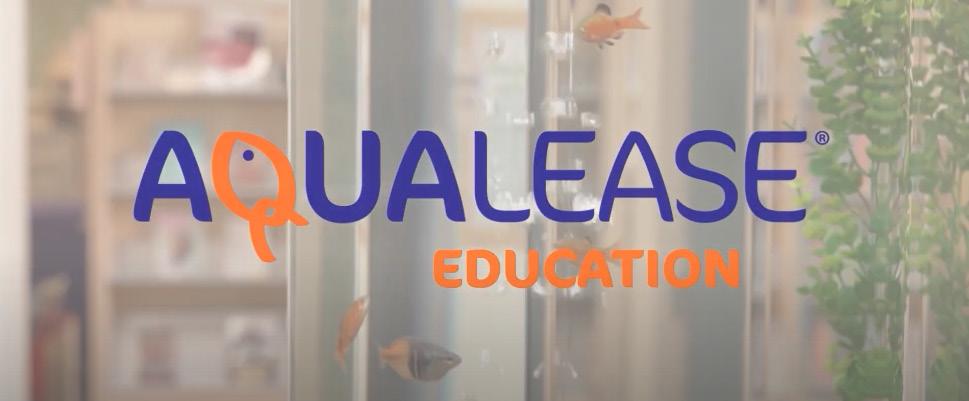
Educational Aquariums
Aqualease have been supplying aquariums to schools, nurseries and other areas of the educational sector since 2003 and have a dedicated team of Marine Rangers who deliver a range of amazing projects and experiences.
It is without doubt that leasing an aquarium for your school will create a sense of fascination and intrigue amongst your students. What better way to spark the imagination than to watch the coming and goings within your aquarium.
There are also times when your aquarium can bring real benefits both physically and mentally to an educational setting. Watching and observing the fish, seeing the plants gently sway in the current can bring a sense of calm and relaxation. Enabling children to feel happy, engaged and ultimately learn and thrive.




Ofsted is overhauling its inspection framework from November 2025 –introducing new grading terminology, report cards, and placing greater emphasis on inclusion, staff wellbeing and parental engagement. Here’s what schools need to know about the changes
Ofsted has confirmed significant changes to how schools in England will be inspected, marking a new era for accountability, parental communication and professional fairness.
From 10 November 2025, inspections across early years, state-funded schools, and further education providers will follow a renewed framework that introduces updated grading, new report cards for parents, and a stronger focus on inclusion, staff wellbeing, and professional collaboration.
These changes are the result of Ofsted’s 2024 “Big Listen” consultation, which invited professionals and parents to share their experiences and offer ideas for reform. The feedback was clear: the inspection system
needed to evolve. With over 6,500 consultation responses and input from sector experts, Ofsted has now unveiled a more balanced approach to inspections – one that holds schools to account without adding undue pressure.
New report cards and grading system
At the centre of the changes is the introduction of a new-style report card , designed to give parents clearer, more detailed information about their child’s education setting. The current inspection reports are being replaced by a concise, mobile-friendly format that combine at-a-glance grades with narrative summaries of strengths and areas for improvement. According to independent polling by YouGov, E
A complete solution for all your needs, trusted by thousands of schools and MATs.
We’ve been working in the education sector for decades. So our experts know how to save you money, and how to take care of your ongoing headaches – like chasing suppliers and checking bills.

Get started
F nearly seven in ten parents prefer this new approach, and almost nine in ten find the new report cards easier to understand.
Perhaps the most significant shift is in the grading system. The old four-point scale, which included ‘Outstanding’ and ‘Inadequate,’ is being replaced with a more nuanced five-point scale. The new grades are: ‘Exceptional’, ‘Strong Standard’, ‘Expected Standard’, ‘Needs Attention’, and ‘Urgent Improvement’. This change is intended to provide more detail and better reflect the varied performance across different areas of a provider’s work. Importantly, it introduces a new top grade – ‘Exceptional’ – to highlight best practice that others can learn from.
Schools and providers that fall short of the expected standard will be monitored more closely, with follow-up inspections designed to drive improvement quickly and effectively.
Another major change is the introduction of a new evaluation area focused on inclusion. From November, every inspection will assess how well a school or provider supports disadvantaged children, those with special educational needs or disabilities (SEND), and children known to social care. This inclusion grade reflects Ofsted’s commitment to making sure inspections look beyond averages and take into account how well the most vulnerable learners are being served.
The current inspection reports are being replaced by a concise, mobile-friendly format that combine at-aglance grades with narrative summaries of strengths and areas for improvement
For early years providers, the frequency of inspections is also changing. Instead of being inspected every six years, early years settings will now be inspected every four, with a stronger focus on the quality of education and care.
The wellbeing of staff has also been brought to the forefront. Ofsted commissioned an independent review of staff workload and well-being, and as a result, new measures are being introduced to reduce inspection pressure. Each inspection team will now include an additional inspector, allowing for more time with school leaders and helping to ensure a more collaborative experience. To cap the length of inspection days, new operating guides set out the times at which inspectors can arrive on site and the suggested latest times they should be departing. E


F Inspectors will also be required to evaluate how well schools support the well-being of their staff, which will be considered as part of the leadership and governance evaluation area. This change reflects growing recognition of the pressures faced by educators and the need for inspections to take a more humane and supportive approach.
Ofsted has said that a new system for monitoring schools where improvement is needed will offer reassurance to parents and carers. These inspections will allow providers to improve ‘needs attention’ grades and have improvements recognised more quickly.
Schools are encouraged to begin preparing for the new framework now. One of the most immediate steps they can take is to familiarise themselves with the new grading definitions and evaluation criteria. Ofsted has published detailed toolkits outlining what inspectors will be looking for under each standard. School leaders should also take a close look at their inclusion practices, making sure they can demonstrate how disadvantaged pupils and those with SEND are being supported effectively.
Another priority will be parental engagement. For the first time, strong communication with parents is being directly assessed during inspection, and no school will be able to achieve the highest grade without demonstrating this.
In gathering evidence about parental engagement, inspectors will consider the
extent to which leaders, including governors, forge constructive relationships beyond the school, so that they can successfully engage with parents and the local community.
Schools will need to reflect on how they involve parents, how they communicate progress and challenges, and how they listen and respond to parental concerns.
Staff wellbeing is another area schools will need to be ready to discuss. Inspectors will consider the extent to which leaders take account of staff’s well-being and make sure their workload is manageable. They will look at whether leaders have effective systems in place to protect staff from bullying and unlawful discrimination, as well as looking for evidence on how leaders make staff feel valued and are supported.
Leaders should review policies, staff surveys, and support systems to ensure they can evidence a genuine commitment to creating a supportive workplace culture.
Ofsted’s revised approach will come into effect from 10 November 2025 for early years settings, state-funded schools, and further education providers. For initial teacher education and non-association independent schools, the new framework will be implemented from January 2026. Notably, there will be no routine inspections during the first half of the autumn term to allow for preparation and training. From 1 December, inspections will resume, with schools that volunteer to be inspected first, before the return to routine scheduling.
To support ongoing improvement, Ofsted will evaluate the rollout of the new framework through a formal programme of review and analysis, including externally commissioned research to assess its impact on providers, parents, and pupils.
Sir Jon Coles, chief executive of United Learning, England’s largest academy trust, concludes: “It is important to our school system, to parental confidence and ultimately to the success of children that there is high quality, trusted, independent and rigorous reporting to parents about the quality of their local schools. I am pleased that the new inspection framework looks set to provide this.”
As Ofsted enters this new chapter, schools should now begin familiarising themselves with the new toolkits to prepare for these new-look inspections. L
Managing security operations in schools can be uniquely challenging. Not only are schools exposed to key risks like theft and vandalism, but legal, ethical and technical factors can introduce additional issues. Security measures must therefore be both intelligent and user-friendly
Robust, yet discreet school security cameras offer a first line of defense against safety risks. Smart multisensor and dome cameras positioned to cover high-risk locations like hallways and classrooms help provide optimal coverage without drawing unwanted attention.
Intelligent cameras like the Avigilon H5A Multisensor and Avigilon H6 Mini Dome leverage advanced sensors and wide fields-of-view to help capture high-quality footage using minimal hardware, which can improve situational awareness without distracting or disturbing students.
For outdoor use, models like the Avigilon H6A PTZ provide 360-degree views of expansive areas like building perimeters, with adjustable pan, tilt and zoom functions and AI analytics features to help identify subtle anomalies like suspicious motion at unusual times. Plus, look for high-impact ratings to ensure school cameras can withstand attempted vandalism.
A further benefit to leveraging smart school security cameras is that they can integrate into wider cloud management systems, enabling inexperienced operators to access, adjust and view devices freely from any secure smart device.
Cloud management systems empower operators to leverage advanced features like AI video analytics from within a userfriendly, remote-access platform. In practice, admins can programme automated alerts for common risks like intrusions, people loitering and loud noises or disturbances.
To improve response times further, school security admins should look to leverage intelligent systems that can interact or integrate. For example, access control and alarm systems may be configured to trigger alerts or specific system actions based on behavior identified by security cameras.
Smart, data-rich alarm systems are another key element of an effective security system for UK schools. Through combinations of connected IoT sensors, alarms and remote-access management software, admins can identify suspicious activities in real-time, with better insight and context for appropriate response. Going beyond traditional UK school alarm systems, Avigilon Alta Protect can integrate with camera, access and alarm systems to remotely warn operators of emerging risks. This solution uses AI-driven video and audio analytics to help prevent escalations by identifying if a person enters an area they shouldn’t be in, and remotely verifying the incident to reduce false positives and speed response. Custom thresholds and responses can be configured to help admins adjust systems to meet unique needs of UK schools. Trends highlighted by AI analytics help inform practical operations, and 24/7 observance provided by internal or external teams helps ensure all risks are actioned according to protocol. While intelligent security systems, such as AI-drive cameras, cloud-based management platforms and smart site protection are important, the key to better operations lies in bringing these components together. Improving security measures for UK schools requires integrating video, access and alarms, and smarter configuration so school admins can easily use their systems for better security outcomes. M

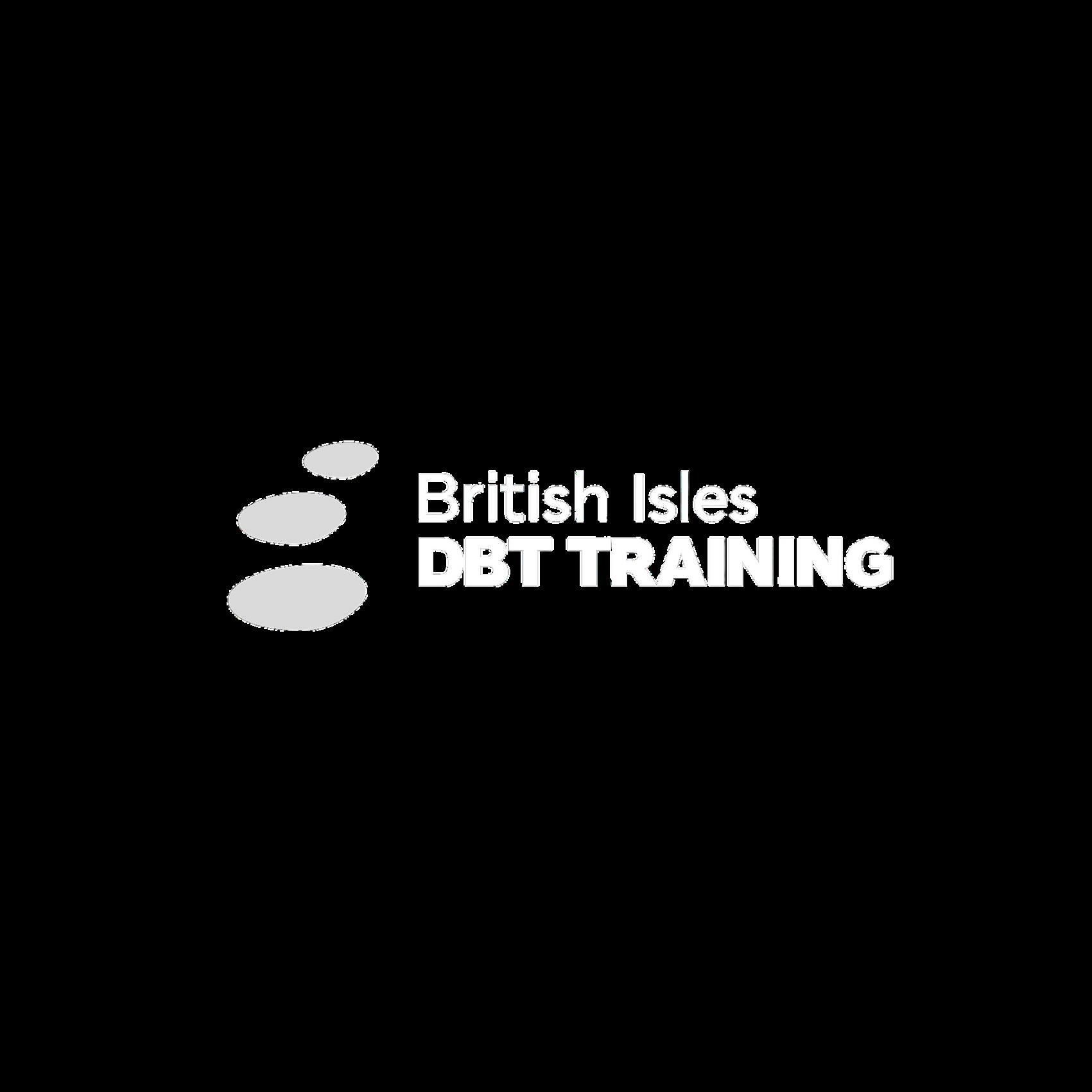
Do you see students struggling with stress, emotions, or f riendships and wish you knew how to help?
Every day, teachers and school staff witness the silent struggles of students: anxiety, low mood, overwhelm and social conflict. You want to help, but often the ‘how’ isn’t clear. Dialectical Behaviour Therapy (DBT) Skills for Educators™ gives you that ‘how’. Practical, evidence-based tools you can start using straight away to make a lasting difference.

What if there were simple, teachable skills every student could use to stay calm, focused, and connected?
DBT isn’t just for therapists. It’s a set of teachable life skills proven to help young people manage emotions, cope with stress, and get along with others. The four DBT skill areas are:
Mindfulness – helping students pause, focus, and be present
Distress Tolerance – giving them tools to stay calm in tough moments
Emotion Regulation – showing them how to understand and manage strong feelings
Interpersonal Effectiveness – equipping them to communicate well and build healthy relationships These skills don’t just help with mental health-they improve behaviour, focus, and readiness to learn.
Can you imagine a calmer, kinder cul ture for both students and staff ?
DBT is making a difference in classrooms right here in the UK Recent studies, including UK-based trials of DBT STEPS-A, show just how powerful these skills can be in educational settings And it’s not just the pupils who benefit Educators trained in DBT skills often say they feel more confident and less stressed when managing difficult situations, because they now have clear, practical tools to use Schools that have introduced DBT programmes report:
Fewer emotional outbursts and incidents of dysregulation
Students with stronger coping mechanisms for everyday challenges
Better peer relationships and a more supportive classroom climate
Whether rolled out universally (so every student learns the skills) or as a targeted intervention for pupils who need extra support, DBT has the same goal: building resilience, compassion, and healthier learning environments
Every Student. Every Classroom. Every Educator.
DBT isn’t limited to one age group; it can be adapted from Key Stage 3 right through to Higher Education, giving young people the tools they need to thrive at every stage
Secondary Schools – supporting friendships, emotions, and exam stress
Sixth Form/College – building resilience, independence, and workload coping
Higher Education – preparing for adult life, deadlines, and independence
Even one trained staff member can spark this ripple effect, spotting distress early and giving students lifelong skills
DBT Skills for Educators™
�� 29–30 June 2026 | ⏰09:00-17:00
�� Early Bird £325* (save £75) – ends 13 March 2026 �� Group rates £300* per person available for 4+ staff. *prices are excluding VAT
In just two days, you will:
Learn the exact DBT skills that can transform student wellbeing
Practise classroom-friendly strategies you can use immediately
Gain confidence in supporting both struggling and thriving students


As mainstream schools strive to become more inclusive, new research from Inclusion in Practice sheds light on what truly works. Drawing on insights from over 8,000 educational settings, this feature explores five key principles that underpin effective SEND provision
The landscape of special educational needs and disabilities (SEND) provision in mainstream schools continues to evolve, with schools and trusts demonstrating determination and creativity in their approaches to inclusion despite challenging circumstances. Recent research from Inclusion in Practice, a collaborative initiative convened by Tom Rees (Chair of the Expert Advisory Group for Inclusion), Ambition Institute and the Confederation of School Trusts, gathered evidence from 165 submissions representing over 8,000 educational settings across England.
This sector-wide endeavour reveals five fundamental principles that underpin effective inclusive practice. These insights, drawn directly from practitioners, demonstrate that inclusion is not about creating separate systems or additional layers of support, but about fundamentally rethinking how schools operate to ensure every child can thrive.
Knowing children well, early and often The foundation of truly inclusive practice lies in developing deep, early understanding of each child. This goes beyond simply identifying E

EFSim is a web-based test that simulates a gamified home environment and measures various aspects of attention, executive function, and prospective memory. The results are then compared against a neurotypical range and a report is then immediately generated with strategies and techniques to help support the child. This test can be performed either at school or at home and is being deployed in schools all over the UK to provide early intervention for kids while they wait for a full diagnosis.


F whether a student has SEND – it requires a comprehensive approach to understanding individual barriers to learning and building relationships that enable tailored support. Effective schools use transition periods strategically. At Blaise High School within Greenshaw Learning Trust, the Special Educational Needs Coordinator (SENDCO) visits each feeder primary school to meet staff and review existing support arrangements. Pupils attend small group sessions during the summer term, create individual pupil passports, and meet key adults before starting secondary school.
Schools are implementing structured observation systems that combine classroom routines, pastoral conversations, and professional judgement. One trust described using classroom observations alongside pastoral notes from teaching assistants and mentors to identify which adjustments might help pupils progress, while small group interventions provide immediate support as relationships develop.
The research consistently demonstrates that inclusion begins with expert teaching. When high-quality, evidence-informed teaching practices are embedded consistently across schools, more learners remain in mainstream classrooms and make meaningful progress.
The foundation of truly inclusive practice lies in developing deep, early understanding of each child. This goes beyond simply identifying whether a student has SEND – it requires an understanding of individual barriers to learning
Schools are implementing frameworks that make good practice systematic rather than dependent on individual teacher expertise. Some referenced established models like the Education Endowment Foundation’s “5-a-day” approach, which emphasises metacognition, flexible grouping, and explicit instruction. Others have developed internal frameworks or teaching toolkits that establish consistent expectations around core teaching practices. Crucially, these schools avoid treating SEND adaptation as a separate consideration.
At Ark Soane Academy in West London, inclusion is embedded into every aspect of curriculum design and teacher development. Staff participate in pre-term induction focusing on inclusive pedagogy, observing lessons and aligning on key strategies. The school’s “Soane Essentials” provide E



As a parent of children with additional needs, I understand the vital role the right sensory tools can play in a child’s development, wellbeing, and ability to learn. Sensory Playground grew from my own family’s journey – a mission to make quality sensory resources more accessible, not only to parents, but to schools, nurseries, and community settings across the UK.

Every product is hand‑selected for its ability to support focus, regulation, and engagement. From fidget tools and calming aids to sensory lighting and tactile resources, the range caters for a variety of needs, including autism, ADHD, sensory processing differences, and anxiety. Each item is chosen because it works – either for my own children or for the many families and professionals I’ve supported.

F shared pedagogical principles that guide all classroom practice, including consistent lesson structures using specially designed booklets that reduce cognitive load and support attention to key learning.
Effective inclusive schools organise their targeted support through clear, tiered frameworks that help staff understand what should be available universally, when more focused intervention is appropriate, and how to access specialist expertise when needed. These graduated models typically include three levels: universal provision (high quality teaching for all), targeted support (additional interventions for pupils not making expected progress), and specialist provision (intensive support for pupils with persistent barriers to learning). This clarity helps staff identify earlier who needs support and respond more confidently.
Star Academies exemplifies this systematic approach through their comprehensive “All Stars Succeed” strategy. The trust has developed detailed “Star Maps” – individual pupil profiles that combine assessment data, identified barriers to learning, and recommended teaching strategies. Importantly, these maps limit recommendations to three to five high-leverage strategies per child, ensuring teachers can realistically implement the guidance. More about this specific practice is available as one of a series of published case studies.

Many schools are training existing staff as Emotional Literacy Support Assistants (ELSAs) or developing other specialist roles within the mainstream environment. This reduces reliance on external services while ensuring support remains closely connected to classroom teaching.
At Ormiston Academies Trust, Specialist Internal Provisions (SIPs) across six primary schools provide flexible, tailored support within mainstream settings, enabling pupils to remain integrated in school life while accessing targeted help.
Inclusive schools recognise they cannot work in isolation. The research reveals that strong relationships with families, local authorities, and external services are essential for creating coherent support systems.
Schools are developing more collaborative approaches to family engagement. Some establish family support hubs that host services, run parent learning programmes, and provide structured spaces for shared decisionmaking. Trust-wide approaches help maintain consistency, with leaders establishing clear expectations for accessible communication formats including audio and video options.
Professional learning communities strengthen inclusive practice through formal learning networks and cross-school coaching. At Windsor Academy Trust, termly Professional Learning Communities facilitate review of current research and effective practices, while Learning Tours enable SENDCOs to observe excellent practice and implement similar approaches in their own schools.
The most effective inclusive schools treat inclusion as a core leadership priority and principle, not a separate system running parallel to mainstream education. When responsibility is shared across teams and guided by clear values, schools can align their planning, development, and accountability processes to drive consistent practice.
This strategic approach manifests in various ways. Directors of Inclusion drive visibility and coordinate strategy across multiple schools, while trustees and governors hold executives to account for inclusive practice through scrutiny of progress data and resource allocation. E

F Dixons Academy Trust exemplifies this integrated approach through their “Mountain Rescue” model, which brings together senior leaders for SEND, safeguarding, and behaviour in shared departmental spaces. This physical and operational integration ensures that support is coordinated and that quality teaching remains the foundation, with targeted pastoral support layered appropriately on top.
The trust has also developed flexible grouping arrangements that challenge traditional assumptions about classroom organisation. Rather than removing pupils with SEND from mainstream lessons, they deploy additional teachers to work with larger groups while providing intensive small-group teaching led by qualified teachers – ensuring highquality teaching is available to all pupils.
These five principles demonstrate that effective inclusion requires fundamental consideration of how schools organise themselves, train their staff, and relate to their communities. The evidence shows promising outcomes where schools embrace these approaches systematically.
However, these examples also highlight the need for broader system reform. As Tom Rees,
chair of the Expert Advisory Group for Inclusion, noted: “This report gives us hope and encouragement, in highlighting pockets of effective and evidence-informed practice being implemented in our schools which we can learn from and build on. But this project has also reminded us how much inconsistency exists within the SEND system in terms of frameworks, training, advice and resources. We should be ambitious for much better support for teachers and schools in the future. This means clearer use of evidence, sharper accountability, smarter systems, and putting children’s needs – not labels – at the centre.”
The schools and trusts featured in this research demonstrate that while the SEND system faces well-documented challenges, there is strong appetite for improvement. The collaborative Inclusion in Practice initiative provides a foundation for sharing this learning more widely. More detailed findings are available through the published report and case studies . As the education system navigates complex funding and policy challenges, these principles offer a practical framework for schools committed to ensuring every child can succeed in mainstream education. L
Tickets are now available to commend settings championing SEND and enjoy an evening with sector innovators

The nasen Awards return for their ninth year, and we’re inviting you to join us for a truly unforgettable evening! Taking place on 3rd October 2025, the awards celebrate individuals, schools, settings, and organisations who go above and beyond to make a difference in the lives of children and young people with special educational needs and/or disabilities (SEND). This is more than just an awards ceremony, it’s a powerful gathering of the SEND community. With 17 diverse categories and a panel of 12 expert judges, the 2025 shortlist reflects the extraordinary work happening every day across the education sector. From early years practitioners and inclusive schools, to outstanding leaders, changemakers, and young advocates. This year’s finalists are shining examples of dedication, creativity, and impact.
Among those shortlisted are River Tees Secondary Academy and St Wilfrid’s Academy for Alternative Provision of the Year; Derwen College and Orchard Hill for FE Provision of the Year; and inspiring individuals like Katie Goodwin and Thomas Keaney, both recognised as Changemakers of the Year. The full shortlist showcases a rich mix of innovation, compassion, and excellence across the UK’s SEND landscape.
At this black-tie event, guests will enjoy a sparkling prosecco reception, a delicious threecourse meal, and an evening of entertainment, including a lively disco to round off the celebrations. It’s a fantastic opportunity to connect with like-minded professionals, celebrate outstanding achievements, and be inspired by the stories shaping the future of SEND provision.
Whether you’re shortlisted, supporting a nominee, or simply passionate about SEND education and inclusion, this event is your chance to recognise those making a real difference for children and young people. Tickets are now available and selling fast so secure your place today! M
The Vox Conference Venue, Resorts World, Birmingham. 3rd October 2025 | 5:30pm – late



Give your students the best spor ting experience with durable, professionalstandard spor ts equipment.
At Stuar t Canvas, we supply and install a wide range of spor ts products designed specifically for educational institutions, including:
Cricket Ground Equipment – Covers, sightscreens & accessories built for school use
Tennis Cour t Equipment – Cour t covers, windbreaks & backdrops & netting.
Football & Rugby Equipment – Goal posts, pitch protection & team shelters
Rugby Post Protectors – New for 2025 safe, durable & fully brandable.
Tailored for your school’s needs
Nationwide installation.
Trusted by UK schools & academies.


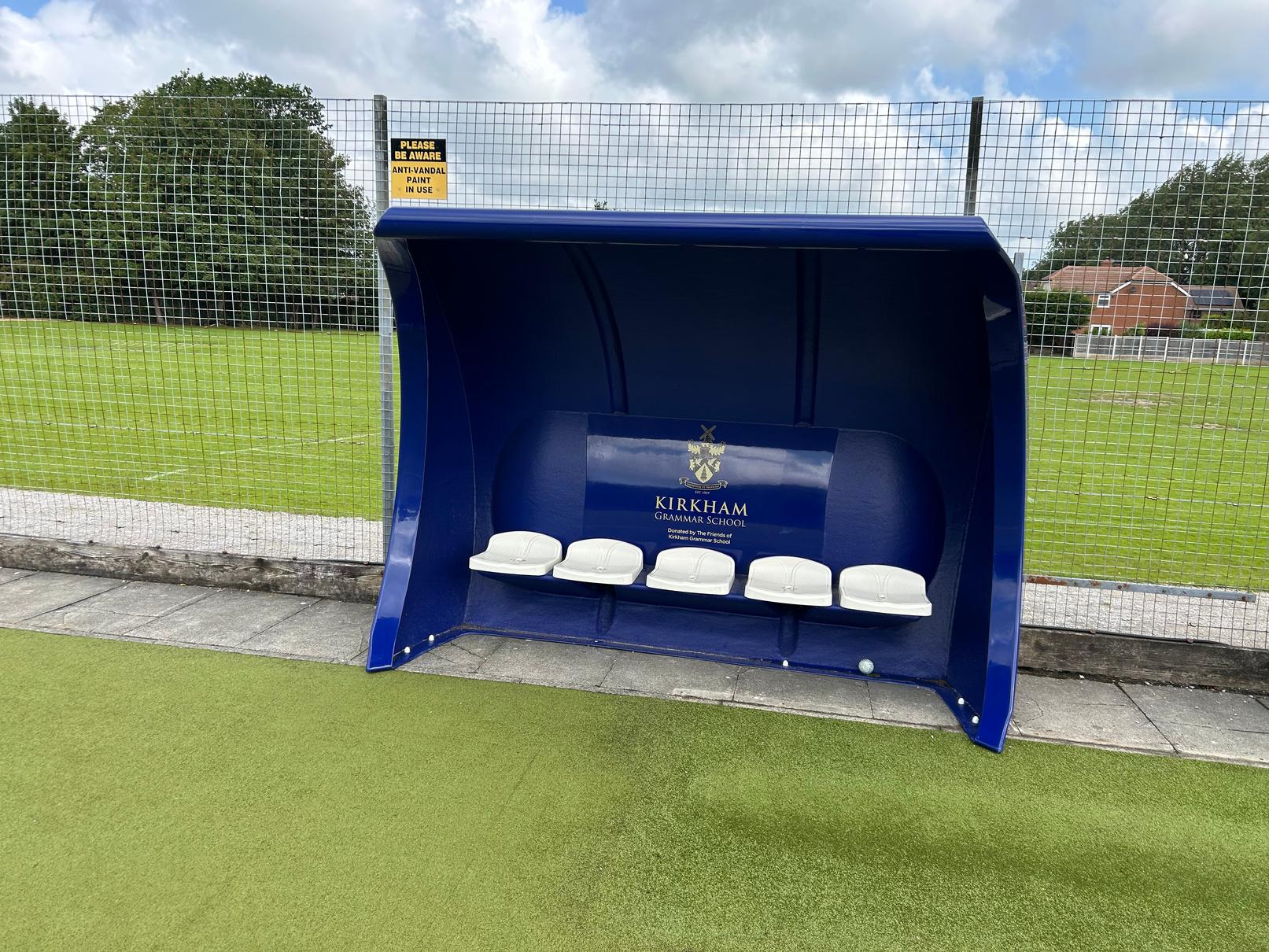


For over 50 years, Stuart Canvas has been helping schools across the UK improve their sports facilities with high-quality, durable, and tailor-made equipment


As a leading manufacturer of sports ground solutions, Stuart Canvas supports schools in maximising playing time, improving safety, and enhancing the sporting experience for pupils of all ages.
Cricket ground equipment: protecting pitches, extending play
Cricket is a staple sport for many schools, yet maintaining pitches in unpredictable weather can be challenging. Stuart Canvas offers a wide range of cricket ground equipment, including flat sheets, mobile wicket covers, and germination sheets, designed to protect playing surfaces and ensure matches can go ahead in optimum conditions. Easy to use and built to last, these products help grounds staff manage pitches effectively, saving both time and resources.

Tennis court equipment: professional standards for schools
With tennis growing in popularity, schools are increasingly seeking reliable, high-quality court equipment to support lessons and
tournaments. Stuart Canvas provides tennis court accessories such as windbreaks, divider nets, umpire chairs, and bespoke covers, enabling schools to create a professional and well-maintained environment for pupils to develop their skills.
Football and rugby solutions: durable and practical
Football and rugby are core components of school sports, requiring equipment that can withstand heavy use throughout the year. Stuart Canvas supplies rugby post protectors, pitch covers, and custom storage solutions that ensure playing areas remain safe, accessible, and protected from the elements.
New for this year, Stuart Canvas has introduced rugby post protectors, designed to improve player safety and reduce impact injuries. Manufactured to high safety standards and fully customisable with school colours or logos, these protectors are a practical and visually appealing addition to any rugby pitch.
Supporting schools nationwide
Stuart Canvas understands the importance of creating safe, resilient, and inclusive sporting environments for pupils. The company’s team of experts works closely with schools to design and supply tailored solutions that meet individual site needs, offering both off-theshelf and bespoke options.
By investing in Stuart Canvas products, schools can ensure their sports facilities are fit for purpose, weather-ready, and supportive of both grassroots participation and competitive play for years to come. M
FURTHER INFORMATION
To discover how Stuart Canvas can enhance your school’s sports facilities, visit: www.stuartcanvas.co.uk or call 01925 814525 to speak with our expert team today

































































































From parking spaces to study areas, offices to lecture theatres, Clearooms can manage and report on the booking of any area, right across your setting.











Quick set-up and easy onboarding including floorplan support and creation




Supports SSO and integrates with Google and Outlook, as well as leading access controls








Detailed utilisation & contact trace reports to gain insight as to how your spaces are used
Great value pricing, based on the number of desks & rooms, not the number of users








UK-based and developed with responsive support
Scalable and cost-efficient, Clearooms lets you make the most of available campus space

As hybrid study and learning models become increasingly prevalent in further and higher education, managing campus space efficiently has never been more important. Ensuring academic and administrative staff can seamlessly transition between remote and on-site work—and that students have reliable access to key learning spaces—requires intuitive and dependable booking systems. This is where Clearooms desk and room booking software comes in: an all-in-one, costeffective, and easy-to-use solution tailored to the evolving needs of universities and colleges. Clearooms offers a flexible, cloud-based platform that enables users to book desks, study areas, and meeting rooms with ease. Designed for institutions of all sizes, it removes the inefficiencies of manual booking processes, enhancing productivity across academic departments and administration while supporting budget-conscious space management. Crucially, Clearooms pricing is based on the number of desks and rooms in the system, not on the number of users— making it a scalable and cost-efficient choice for higher education institutions with large user bases.
With single sign-on (SSO), Clearooms integrates easily into existing IT infrastructure, offering secure, hassle-free access for staff and students. Whether managing a single department or multiple campuses, the system adapts to complex institutional structures without compromising performance.
Clearooms is backed by a UK-based support team who work closely with education institutions to ensure smooth onboarding and long-term success. From floorplan creation to custom onboarding and dedicated customer service, institutions benefit from expert guidance at every step. As a provider featured on the Government Procurement Portal, Clearooms is already a trusted solution for many public sector bodies, bringing a deep understanding of the compliance, access, and resource-sharing needs that mirror many of the challenges faced by universities.
By reducing the need for redundant or underused space, Clearooms supports institutions’ environmental targets while ensuring that resources are allocated based on real-time demand. Its built-in reporting tools also allow facilities teams to track space usage and make informed decisions for future planning.
For higher education institutions navigating the complexities of hybrid working and studying, Clearooms desk and room booking software is a key enabler of flexible, efficient, and data-driven space management. With robust integration, expert UK-based support, and proven success in the public sector, Clearooms is helping campuses streamline operations for enhanced learning outcomes. M
For more information and to book a demo, please visit www.clearooms.com/education


Sportsafe’s DBS-registered, RPII-qualified engineers ensure top safety and compliance, with nationwide coverage never more than 90 minutes away Our electronic reporting system provides remedial work quotes within 2 working days, and an inspection certificate is issued upon a pass or completion of required repairs All remedial work is backed by a 12month workmanship warranty for your peace of mind.
We offer a broad variety of sports and fitness installations to suit all your needs: from tennis courts, MUGAs and line markings to basketball goals, climbing frames and division nets
We can do it all
Get an exclusive £15 off your next online order with us, using code EDUCATION15.

Established in 1997, Sportsafe provides the professional supply, installation, inspection and maintenance of sports, fitness and play equipment.
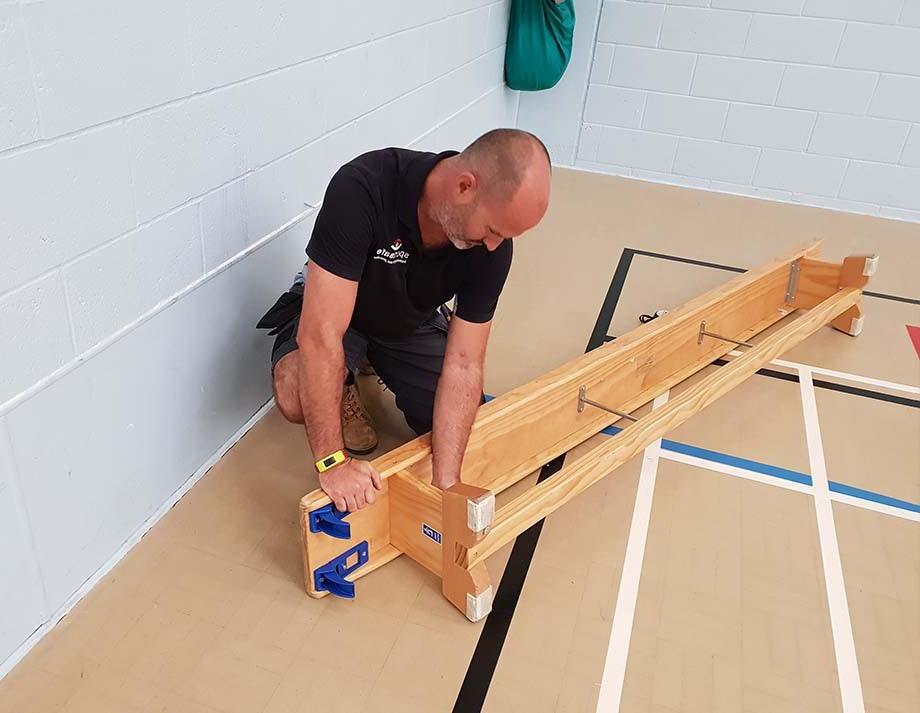




Ross McTaggart from the Chelmsford Learning Partnership explores how intentional, well-designed play spaces can boost emotional wellbeing, improve behaviour and strengthen learning
Did you celebrate National Day for Play on 6 August? The event, created to celebrate children’s right to play and champion the importance of play in children’s development, also emphasises the vital role that schools and other organisations have in creating opportunities for children to play.
It is well recognised that intentional play strengthens children’s cognitive skills and builds their emotional resilience and social competence, thereby laying a strong foundation for lifelong learning. Structured play, led by adults and focused on specific goals, is a crucial part of children’s development. Yet, unstructured play, led by the child and driven by their interests and imagination, is just as important.
Research reveals that children in England are becoming increasingly “sedentary, scrolling and alone”, with a significant
decline in opportunities for play due to factors like loss of safe outdoor spaces and excessive screen time. Research also shows that today’s children benefit from less time and space for unstructured play activities than previous generations, as budgets for public parks and play areas have been squeezed and school days have changed to accommodate national curriculum requirements. Now, more than two million children aged up to nine years old no longer live within a 10 minute walk of a playground. Appropriately, the theme of this year’s National Day for Play was ‘spaces for play’, which served to emphasise the value of accessible and safe spaces dedicated to play. While these may often be parks, natural spaces, such as woods, beaches and rivers, are also good examples of environments that encourage play with no specialist equipment needed. E

Medpacs are the ultimate UK-designed solution for storing and managing school medications. Durable, cost-effective, and easy to use, Medpacs ensure quick access to correctly labelled medications for school trips, sports, and daily needs. Secure and streamlined—Medpacs are the smart choice for every educational setting.






Barnes Farm Primary School introduced the OPAL Primary framework to improve the quality of its play. The team created a play curriculum that develops skills and creates opportunities to socialise
F In 2023, Barnes Farm Primary School, one of our trust’s primary schools, introduced the OPAL Primary programme framework to strategically improve the quality of its play. The framework guided the team to create a play curriculum that develops skills and creates opportunities for children to socialise. Below are some of the changes that were implemented and the benefits seen since focusing on intentional play.
While every school has different facilities and space available, there were opportunities to create active and quiet spaces to encourage a variety of styles of play. At Barnes Farm
Primary School, the team created different zones to meet the needs and interests of pupils, using the space available to them and theming them appropriately.
Active play was encouraged through the sandpit and tyres, while creative zones were established with items for dressing up, a mud kitchen and a cardboard city to explore. Quieter reading areas were created for pupils who prefer to read. Different textures, natural materials and colours were also used throughout the zones to provide sensory stimulation.
Each zone and activity helps pupils to develop different skills and attributes, whether these are physical, social or emotional. Through sensory exploration in the sandpit, pupils strengthen their fine motor skills and develop important cognitive skills such as creativity, problem solving and communication. Unstructured play in the mud kitchen with their friends and peers encourages creativity, communication, cooperation and conflict resolution – all valuable skills for the classroom too.
Playtime also provided important opportunities to initiate conversations about risk, building independence and confidence E
Tatum, Brick Club learner, aged 8
We’re Play Included, the world’s leading LEGO® therapy experts. We train educators to deliver Brick Clubs – specialist workshops that unlock every child’s growth through play.
Our programme is backed by the LEGO Foundation and delivers proven social and emotional outcomes. The modules are fun, easy to follow and equip teachers, TAs and
SENCOs with the tools to build children’s confidence, communication skills and their sense of belonging.
With bespoke packages and group discounts to fit your budget, isn’t it time your school got an OMG review?
Let’s connect! Click to arrange a call to learn about our packages
Play Included is transforming the way educators support children’s social and emotional development through the power of play. As pioneers of LEGO® therapy, their Brick-byBrick® programme—endorsed by the LEGO Foundation and grounded in psychological research—empowers educators to create inclusive, engaging spaces for children to thrive. The Brick-by-Brick® programme equips educators to run specialist Brick Clubs, where children collaborate on LEGO building activities that foster teamwork, communication, and creativity.
These sessions are tailored to meet the unique needs of each child. The result? Children gain confidence, develop friendships, and build skills that extend far beyond the classroom.
“Before Brick Club, I used to feel quite nervous. Now I’m much more confident talking to peers,” shares Allan, age 11.
Play Included’s expertise is unmatched, with its programme founded by one of the original creators of LEGO therapy. Trusted by schools worldwide, their evidencebased approach delivers measurable improvements
in children’s communication, collaboration, and emotional wellbeing.
Whether through in-person workshops or online sessions, Play Included offers flexible, impactful solutions for educators. Unlock the potential of play and help children grow—one brick at a time. M


F as pupils were encouraged to consider risks within a safe environment. At Barnes Farm Primary School, the rules for playtime were co-created with pupils to create a sense of ownership and understanding, building a sense of responsibility for their environment and strengthening their self-confidence.

The safe and supportive environments for play that enable pupils to take risks and grow in confidence also allow them to identify, express and manage their emotions. Not only does play help pupils to develop and practice coping mechanisms for managing challenging emotions through role play and scenarios, it also means they can express their emotions both verbally and non-verbally. The rules that they co-created provide a structure to support self-regulation and consideration for others.
Guided play is particularly beneficial for supporting emotional and behavioural regulation as a trusted adult can model calming strategies, praise positive behaviour and provide reassurance.
As pupils build the tools and strategies they need for self-regulation, play, particularly outdoor play, can also help to reduce stress and improve emotional wellbeing. At Barnes Farm Primary School, we saw significant improvements in low-level behavioural incidents post-playtime since the introduction of our lunchtime play sessions. We also noted that the play curriculum provided an incentive for our pupils who were struggling to attend school on challenging days due to the fun that they have during these sessions. These children often told the school that it was the draw of a particular play zone that meant they were more motivated to come into school on difficult mornings. E




In conjunction with emotional and behavioural improvements, we also saw improvements in pupils’ ability to concentrate in the classroom post-playtime. Reduced disruption meant that all pupils engaged with their learning. In addition, the numbers of children requiring low-level first aid were significantly reduced, which freed up the midday staff to more positively engage with the children around them. By expanding the options for play beyond ball games and other traditional outdoor activities, teachers also saw pupils form unexpected connections with peers outside
of their typical friendship groups, which led to improved dynamics in the classroom and a greater sense of belonging for some children. By dedicating the time and resources to developing a more structured play curriculum at lunchtimes, we saw improvements in all eight hours of the school day. The skills that we have seen pupils develop during their lunchtime play sessions since implementing an intentional play-based curriculum have also had an impact on their performance in the classroom, helping them to become strong, more confident communicators, take more risks and solve problems. L

For children that don’t respond well to sitting at a desk or those with SEND, there is another way to learn


Our learning activities, written by teachers, are delivered using the engaging graphics printed onto our activity mats. The printed graphics show children of any age and language ability, how to engage in the activities without the need for explanation. Lessons become childcentred and child-led.
The unique, colourful graphics, printed onto each mat, are designed to draw children in through curiosity, and invite them to engage by copying the movements of the stickman character and the fun pictorial images and therefore be empowered to self-determine their work with the mats.
The simplicity means that Action Mats sessions are the quickest lessons to embark upon as children simply pick up a mat, find a space and start doing what the graphics show them. Once warmed up, then the session leader can refer to our activity plans to decide the direction of the lesson.
Each set comprises of multiple mats that are lightweight but nonslip, so can be easily moved around into the many different configurations devised by teachers to ensure meaningful quality lessons are delivered.
Lessons focus on teamwork, problem-solving, peer support and cooperation.
Action Mats resources are perfect for EAL and SEND children.
Three core sets are available, Action Packed, Mini Mats and Mindful Mats. Action Packed and Mini Mats can be enhanced with booster packs to support literacy and numeracy.
Our Action Maths intervention programme for KS1 and KS2, designed to be used with our Action Packed set, features 60 lessons to support the UK Maths curriculum. It is immersive active learning that delivers the maths curriculum in a way that reaches those that don’t learn well when sitting behind a desk and also those that perhaps love maths but don’t enjoy physical activities.
Mini Maths is a series of learning activities to help Early Years with their confidence with numbers through subitising, ordering and values games. Mini Maths lessons also promote peer support and positive interaction with other pupils, promoting sharing and encouragement. Mini Maths give early years children secure numeracy knowledge and helps make them ready for onward learning.
Action Mats resources have depth and longevity, being flexible to suit freeform use or structured learning environments. The activity plans are teacher-written and easy to follow. Lessons are accessed online and can be shared with all staff to ensure the maximum is gained from meaningful movement. M
FURTHER INFORMATION
www.actionmats.co.uk
TG Escapes, Manufacturer of the Year at the 2025 Modern Methods of Construction Awards, were also awarded Primary School Project of the Year for their changing facilities at Edgeborough School
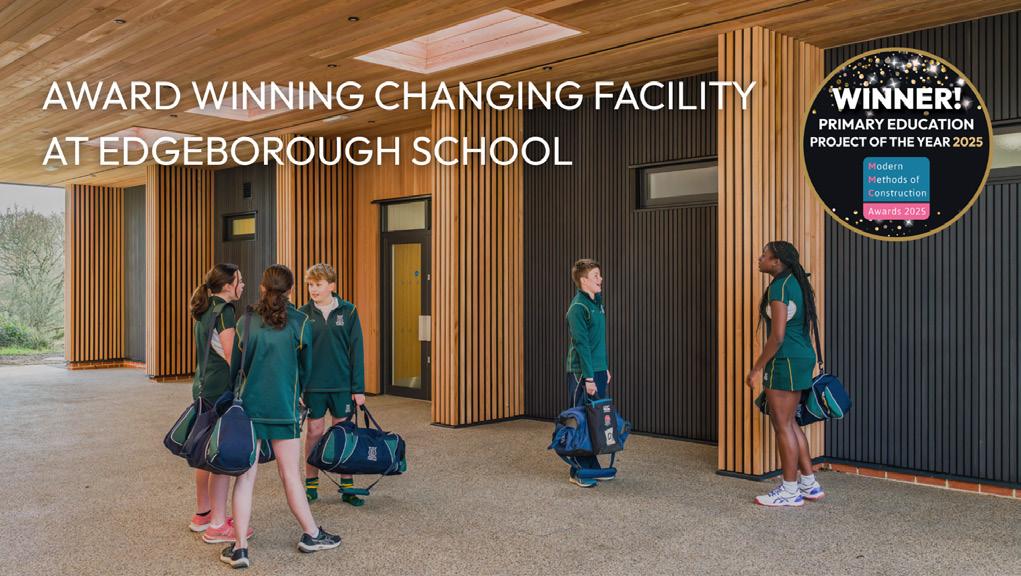
This project is the latest example of sports and leisure facilities, designed and built by TG Escapes, demonstrating a growing interest in the use of modular construction for this sector. The use of timber frame and cladding, along with energy efficient technology, helps create a different type of leisure facility that is both functional and aesthetically pleasing.
Biophilic design is a philosophy based on humanity’s innate need to connect with nature. In architecture, this translates to using natural materials, maximising daylight, and creating a seamless flow between indoor and outdoor spaces. The benefits are profound: reduced stress, improved mood, and heightened mental clarity. When applied to a sports or leisure environment, this approach creates a calming, restorative atmosphere—the ideal mindset for focusing on performance or winding down after a tough session.
TG Escapes achieves this by engineering beautiful buildings using sustainable timber frames. The modular off-site construction process means a new pavilion can be delivered in a fraction of the time of a traditional build, with minimal disruption to pitches and club activities. The result is a highly insulated, energy-efficient structure with a warm, welcoming aesthetic that stands in
stark contrast to the cold, sterile feel of older facilities.
Healthy buildings, healthy communities
TG Escapes has applied these principles to the new changing rooms at Edgeborough School, elevating a purely functional building into a positive space that supports the well-being of young athletes.
Bursar Sarah Riley says: “The new changing rooms have been met with fantastic feedback from pupils, parents, and staff alike. Pupils are loving the fresh, modern space, which offers a much-improved experience before and after games. Parents have expressed their appreciation for the high-quality facilities, recognising the investment in enhancing school life. Staff have also praised the design and functionality, highlighting how the upgraded space makes managing sports sessions smoother and more efficient. Overall, they have been a hugely positive addition to the school!”
TG Escapes provide a design and build turnkey service including everything from planning to handover. They are a Construction Line Platinum member, a Structural Timber Association gold member, and an ISBL approved partner. M
FURTHER INFORMATION
call 0800 917 7726, email info@tgescapes.co.uk or visit www.tgescapes.co.uk for video case studies


The Department for Education has asked schools to have a climate action plan in place by the end of the year. So, as the new school year starts, where should schools begin? The Let’s Go Zero campaign offers free expert support to help schools cut emissions, save money and protect pupils from the impacts of climate change
As students across the UK settle into the new school year, education leaders are being called to prioritise a different kind of lesson plan – one that tackles the climate crisis head-on. With the clock ticking towards the government’s 2025 deadline for climate action planning in schools, the Let’s Go Zero campaign is urging schools to take immediate, practical steps to safeguard their future.
Let’s Go Zero is the national campaign uniting over 7,000 schools, colleges, and
nurseries in a shared mission to become zero carbon by 2030. Now, as the new academic year begins, it’s offering schools free, expert help to meet the government’s expectations – and go even further.
The Department for Education has made its position clear that by the end of 2025, every education setting in England must have a detailed, holistic climate action plan in place. These plans are intended to help schools reduce carbon emissions, lower energy E



Let’s Go Zero is the national campaign uniting over 7,000 schools, colleges, and nurseries in a mission to become zero carbon by 2030
F bills, and better prepare for the escalating impacts of climate change – from extreme heat to flooding and rising food costs.
To help make this ambition a reality, Let’s Go Zero is offering free one-on-one support from its team of Climate Action Advisors. These advisors work directly with school staff to co-create tailored climate action plans, identify funding streams, and implement practical, achievable changes. From energy audits and transport strategies to outdoor learning and waste reduction, the programme helps turn climate concern into measurable results.
And the results speak for themselves. Over 5,500 schools have already received guidance from a Climate Action Advisor, and more than 1,200 have developed a full climate action plan through the programme. So far, the schools involved have saved 6,164 tonnes of CO2e, with an additional 45,990 tonnes of potential savings projected based on current plans in progress. A total of £1.6 million in funding has also been unlocked to support these efforts.
The Department for Education’s official Climate Action Framework sets out four key pillars that all schools should consider when developing their plans. These include E








F adaptation and resilience to prepare for climate impacts such as heatwaves and flooding; increasing biodiversity by enhancing school grounds and helping students connect with nature; embedding climate education and green careers into the curriculum; and cutting carbon emissions through energy efficiency, sustainable transport and procurement choices. Let’s Go Zero’s advisors are already helping schools turn these policy pillars into tangible action – in classrooms, canteens, corridors, and playgrounds.
Alex Green, Head of Let’s Go Zero, believes this term is a crucial moment for schools to take climate leadership seriously. “No school has to do this alone. Our Climate Action Advisors are already helping thousands of schools turn ambition into action, and we’re ready to help thousands more,” Alex says.
Many schools that have already taken part describe the programme as transformative.
At Central Park Primary School in Newham, East London, a visit from Climate Action
Advisor Holly Campbell revealed just how urgent action had become. The school’s playground tarmac was recorded at over 40°C on a 27-degree day – creating difficult learning conditions and real health risks for students. With Holly’s help, the school planted nine trees, creating a shaded, welcoming environment that has transformed break times and received praise from pupils and visitors alike. Sustainability lead and Year 5 teacher Shannon Griffin said the programme gave her the structure and momentum she needed. The school has since rolled out a wide range of initiatives including School Streets, food sustainability projects, a green wall, and composting - all supported by the guidance and encouragement of their Climate Action Advisor.
In Leicestershire, Karen Lambert, head of Stathern School in Melton Mowbray, worked with advisor Jelly Moring to develop a tailored action plan that quickly turned strategy into measurable impact. After identifying energy loss from draughts in windows and doors, Karen integrated sustainability into the school’s three-year development plan. She described E
F the process as timely and proactive, allowing the school to take the lead rather than simply react to the 2025 requirement. Meanwhile, in Coventry and Warwickshire, the Finham Park Multi-Academy Trust has seen a significant drop in energy use after support from Let’s Go Zero. At Finham Park 2 secondary school, energy consumption fell by 14 per cent in just one term, with CO2 emissions dropping by 25 per cent after the school implemented changes identified in their energy audit. The rest of the Trust’s eight schools are now adopting similar approaches, showing the power of a ripple effect when climate action is embedded into school leadership and planning.
Three quick steps to get started
Begin by signing up to Let’s Go Zero – it’s completely free and connects your school with a growing movement of over 7,000 others already taking action. Signing up is a powerful way to show your students, staff, and wider community that you’re committed to tackling the climate crisis. Next, book a session with a Let’s Go Zero Climate Action Advisor. These experts provide one-to-one support tailored to
your school’s unique needs, helping you create a practical climate action plan that covers everything from energy use and transport to curriculum changes and boosting biodiversity.
Then, take your first step. Start with something simple to build momentum – whether it’s organising a uniform swap, carrying out an energy audit, or planting trees to support wildlife. Every action, no matter how small, moves your school closer to a zero-carbon future.
Let’s Go Zero is coordinated by Ashden, a climate solutions charity with a longstanding reputation for supporting schools to reduce emissions, save money, and inspire students. The campaign has grown rapidly, bringing together thousands of schools in a shared commitment to a zero-carbon future. More than 7,190 UK schools have signed up to date, and that number continues to grow as awareness and urgency increase.
Let’s Go Zero is more than a campaign – it’s a movement that empowers young people to see that their voices matter, and that their schools can lead the way in building a better, more sustainable world. L

There are a number of initiatives underway aimed at improving the future health of all buildings, but are they working? And how do we embrace all improvement aspects for a defined optimisation guidance for those teaching and learning in them?
Having surveyed structures reported to be suffering damp, condensation, mould or heat related issues, our reliable data confirms the structures to be dry and stable. However, ventilation related installations and any retrofit aspects designed to improve the likely causes of such issues—plus improve the internal environment for the longer term—have shown to be inadequate and misaligned to the resultant root causes.
The absence of guidance to those who’s task is to maintain a healthy internal environment has led to repeat problems due to a lack of knowledge on how to utilise installed measures aligned to managing their normal everyday activities.
A healthy building should not experience contributory defects that could impact its comfortable environment.
Whilst recognising that embracing a host of insulation measures to reduce the carbon footprint and uphold the Net Zero journey is a future-proof process for today’s new builds, how the current building behaves and what it requires to maintain its desired healthy environment are key to securing a long-term approach.
Existing standards, guidelines and certifications are recognised measures of compliance for a building. However, they do not readily align to the ongoing everyday aspects necessary to maintain enduring healthy environments.
For example: what if guidance was provided alongside where an extractor was installed and how it was operated? What if guidance was given to the use of background trickle vents and opening windows? What if guidance was given to placing furniture against north-facing elevations? And, what if guidance was given to changing the classroom atmospheres after use?
Although not recognised formal guidance protocols, they have an important role to
play with regard to maintaining the expected construction aspects for a prolonged healthy environment.
Cornerstone have undertaken many independent expert surveys to assist defining the root causes of these problems and, numerous repeat aspects whether singular or multiple, have been witnessed that serve to undermine the expected healthy structure.
Our experience suggests the absence of SMART knowledge that can deliver simplistic yet credible reasoning behind many everyday activities in schools that if not fully understood, can and do lead to the defects reported.
If an occupant was provided with a certified structural health condition alongside key recognised everyday undertakings to maintain a healthy environment, would we see a reduction in reported issues?
Cornerstone offer CPD Damp & Mould Training; CPD Ventilation Training; Certified Property MOT® Assessments; Certified Ventilation MOT® Assessments. M

Whether it’s negotiating fair energy contracts, validating bills, or guiding schools towards net zero, Utility Aid works as an extension of your team, here to safeguard your interests so you can focus on education
Behind every energy bill is an organisation delivering vital services. For schools, colleges, academies and universities, those services mean shaping futures, inspiring young minds and providing safe environments for learning. At Utility Aid, we never lose sight of that bigger picture.
For more than 20 years, we’ve worked with charities and not-for-profit organisations to reduce costs, recover overpayments, and simplify the complex world of energy. Our customers range from housing associations and community groups to churches, frontline services, and, of course, educational institutions. Every case is unique, but our approach is always the same: combine expertise with care, and deliver results that make a measurable difference.
As our CEO, Giles Hankinson, puts it: “We exist to help not-for-profit organisations source energy. We use our knowledge and experience. We anticipate and solve problems. Above all, everyone at Utility Aid is united by their desire to do more good for our stakeholders.”
That purpose drives everything we do. Whether it’s negotiating fair contracts, validating bills, or guiding schools towards net zero, we see ourselves as an extension of your team, here to safeguard your interests so you can focus on education.
Services tailored for education providers
Dedicated account management: Forget juggling multiple contacts and chasing suppliers yourself. We assign you a personal account manager who becomes your single point of contact for all energy matters.
Bill checking: Energy billing errors are more common than you might think, and they add up quickly. Our validation team takes this worry off your plate completely with a straightforward four-step process that requires nothing from you.
Net Zero and carbon reporting: expert support to help schools and trusts reduce consumption, unlock funding, and demonstrate environmental leadership.
SECR compliance simplified: accurate reporting, audit-ready documentation and practical recommendations.
ESOS assessments : turning audits into strategic action plans that cut costs and improve efficiency.
With nearly three decades of experience, we know that competence builds trust; and trust, backed by results, creates lasting partnerships. That’s why so many education providers rely on Utility Aid to not only save money but also strengthen their sustainability commitments.
Energy management may not be your core mission, but it is ours. By partnering with Utility Aid, your institution gains the peace of mind that every detail is being managed professionally, ethically and with your best interests at heart. M
To learn more about how we can support your school, trust or university, please visit www.utility-aid.co.uk

The government has pledged £20 billion over the next decade to rebuild and modernise England’s school estate, with the expanded School Rebuilding Programme promising to transform 250 more schools. We examine what’s new for the programme
The government has pledged to rebuild 250 additional schools as part of its flagship School Rebuilding Programme (SRP). Backed by a ten-year infrastructure strategy worth £725 billion, nearly £20 billion has been ringfenced specifically for rebuilding projects in education, with a vision of creating safer, greener, and more resilient school buildings across the country.
The School Rebuilding Programme was launched in 2020 and originally aimed to refurbish or rebuild 500 schools and sixth-form colleges across England over a decade. While the original programme had a slow start due to the pandemic and wider economic pressures, the pace has since increased, with 518 projects now approved and many under construction. E
T h e p e r f e c t t i m e t o P R O T E C T
M A I N T E N A N C E F R E E A N D H Y G I E N I C
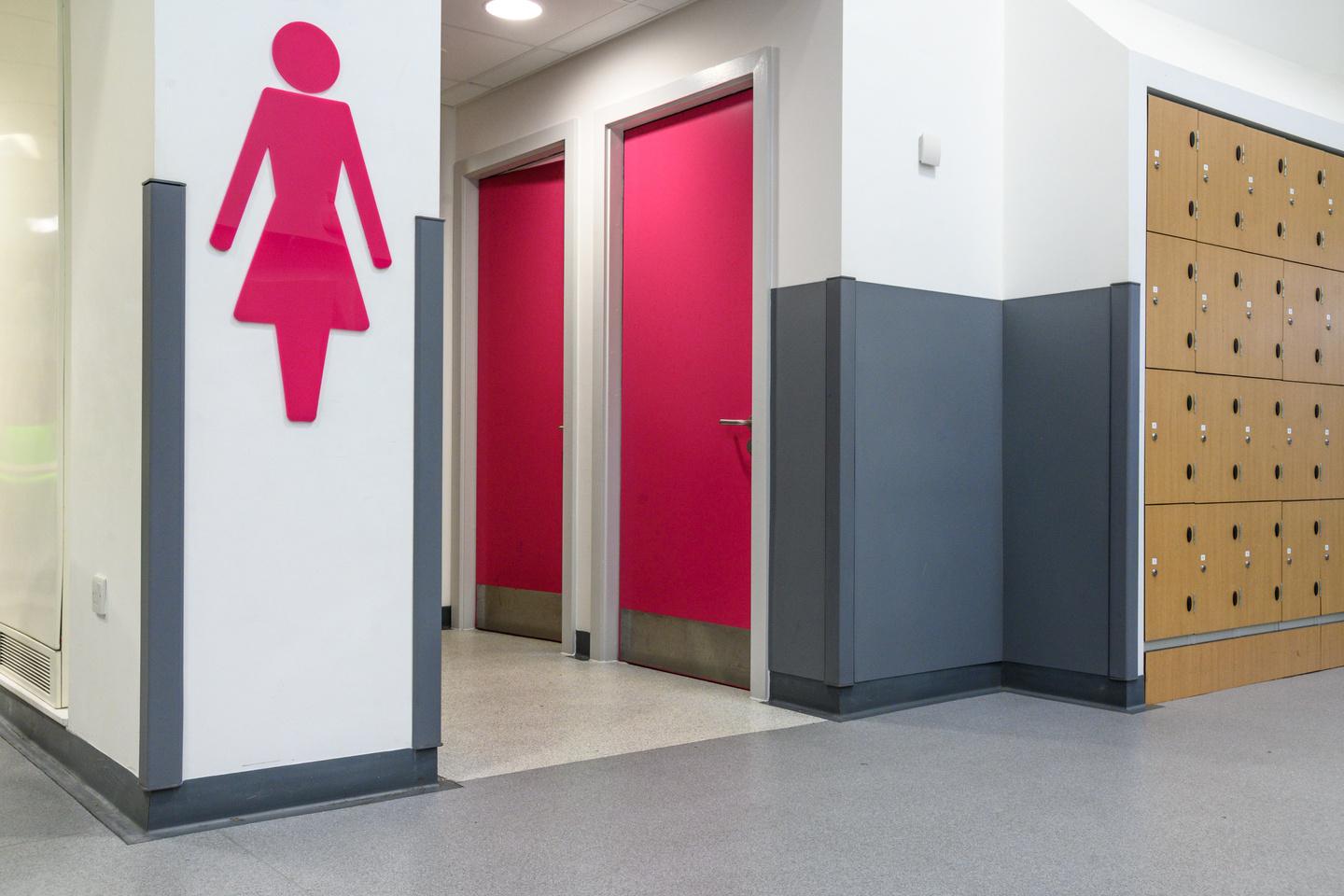
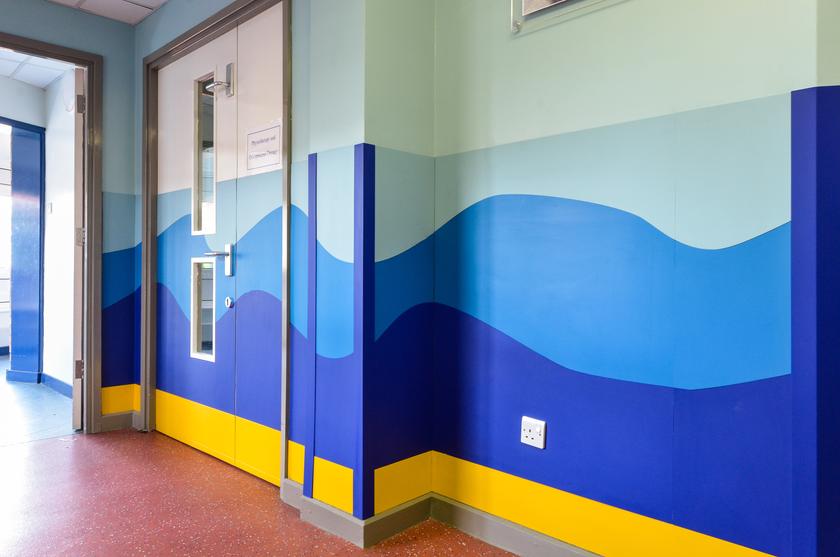
f o r m o r e i n f o r m a t i o n c a l l

A b u d g e t f r i e n d l y c o m p l e t e s y s t e m
o f w a l l a n d d o o r p r o t e c t i o n t h a t ’ s
b u t i f y o u s h o u l d n e e d h e l p w e o f f e r
a n e x p e r t f i t t i n g s e r v i c e .
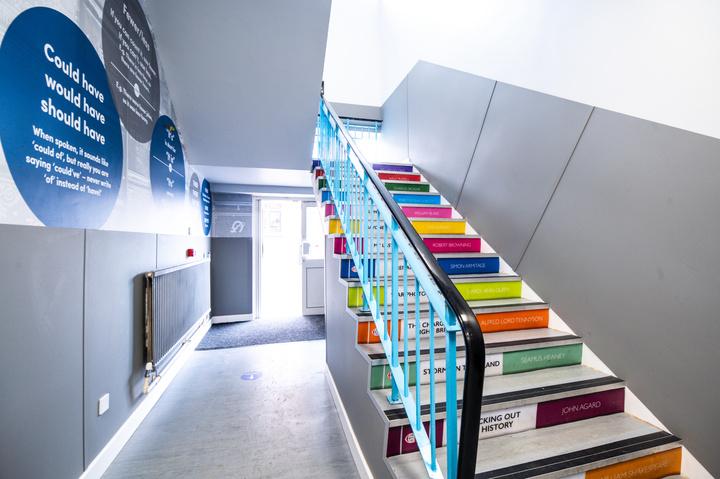
w w w . y e o m a n s h i e l d . c o m

o r e m a i l easy to fit, 0 1 1 3 2 7 9 5 8 5 4
i n f o @ y e o m a n s h i e l d . c o m

F These include schools prioritised for replacement because of structural concerns, such as those containing reinforced autoclaved aerated concrete (RAAC), or those identified as having the most urgent condition needs.
New schools will be delivered to an updated output specification, designed to build on lessons learned from earlier phases of the programme
Now, as part of the recently published National Infrastructure Strategy , the government has confirmed that a further 250 schools will be selected for inclusion in the programme within the next two years. And while the £20 billion earmarked for school buildings includes some existing projects under the SRP, the government has also declared that it is investing almost £3 billion per year by 2034-35 into the annual maintenance budget, rising from £2.4 billion in 2025-26.
Chancellor Rachel Reeves, who unveiled the plans during the government’s spending review, drew on her own school experience in making the case for change. She told MPs: “People who went to ordinary comprehensives like mine in the 80s and 90s are all too familiar with the experience of being taught in temporary classrooms.”
“It wasn’t acceptable when I was at school, and it isn’t acceptable now,” she added. E


RAAC is potentially a very serious problem in schools, colleges and other types of buildings. But it is a myth to say that it must always be replaced at great cost.
Albert Cole Consultants take a proactive approach to determining the presence of RAAC, and are able to offer a full service from inspection, to Structural Engineering input to advise on the next steps should it be discovered, including loading calculations and advice on whether it needs full removal or can simply be left in place with additional supporting measures.







The programme’s longer-term structure has been welcomed by many in the sector who have called for stability after years of stopstart capital investment. In its own strategy document , the Treasury acknowledged that inconsistent funding in the past had undermined market confidence and hampered the development of skills, technologies and supply chains necessary to support large-scale delivery. By contrast, the new plan promises a “stable pipeline of standardised projects” that will deliver school buildings which are net carbon zero in operation, more climateresilient and more cost-effective to run.
Sustainability remains at the heart of the updated SRP. New schools will be delivered to an updated output specification, designed to build on lessons learned from earlier phases of the programme. Projects will be required to meet stringent environmental
The Department for Education is currently procuring new construction frameworks that will demand even higher standards from contractors –not just in quality and value, but also in terms of social impact
standards, helping schools cut emissions and energy use while improving the learning environment for pupils and staff alike.
The Department for Education is currently procuring new construction frameworks that will demand even higher standards from contractors – not just in quality and value, but also in terms of social impact. These will include requirements for hiring apprentices, supporting local SMEs, and contributing to community development as part of each project.
The SRP’s emphasis on standardisation, sustainability and long-term delivery is aimed at breaking the cycle of decay that has E

The Condition Improvement Fund (CIF), provided by the Department for Education (DfE), gives eligible academies, sixth-form colleges and voluntary-aided (VA) schools the opportunity to apply for funding to improve the condition of their buildings

Bauder can assist you at all stages of this funding bid process by helping to prepare, complete and submit your application for CIF finances from the Education and Skills Funding Agency (ESFA).
The CIF bidding process is increasingly competitive, with approved projects for 2025 down 29 per cent on 2024. It is, therefore, more important than ever that applicants demonstrate a clear need, a well-planned project and value for money to have their bid accepted.
A no-obligation Bauder moisture mapping survey (MMS) of your roof can help give your CIF bid a competitive advantage.
A Bauder moisture mapping survey uses a Troxler density gauge to carry out a forensic analysis of your roof to scientifically verify the specific levels and locations of moisture. This testing method ascertains the true condition of the roof and generates a visual data report (roof moisture plot) to determine what action (if any) is required.
This means that rather than being vague or relying on non-scientific assumptions, your CIF application can include a data-driven project proposal, detailed, quantified project costings, and an accurate project timeline.
Because a Bauder moisture mapping survey pinpoints areas of moisture within a roof, the original insulation can often be retained (where dry), rather than overlaying the entire roof. As such, your CIF bid may result in cost savings from reduced labour and materials and time savings for minimal disruption to employees and students.
In addition, the environmental benefits of performing remedial action on only the areas of the roof that require it include a more energy-efficient building (meaning lower energy bills for your school), as well as less embodied carbon becoming landfill waste.
Proactive roof management is key in today’s education environment to avoid classroom closures and interruptions to the school curriculum. With our long-standing relationships with schools and academies, Bauder is strongly positioned to advise and deliver the optimal flat roof solutions for your facility.
A Bauder-assisted CIF grant to finance improvements to your building’s flat roof is the first step in helping the DfE and your school meet its net zero targets with a waterproof and thermally efficient roof. M
For a no-obligation moisture mapping survey, or to find out more about how Bauder can assist with your CIF bid, get in touch on 01473 257671 or visit www.bauder.co.uk/contact


F plagued parts of the school estate since the cancellation of the Building Schools for the Future programme over 15 years ago.
As for the schools themselves, selection for the programme remains based on clear criteria. Projects are prioritised where buildings are of construction types that require replacement, where condition data points to severe need, or where there are risks to health and safety. Schools granted a provisional place on the programme undergo further due diligence before entering delivery – at a rate of approximately 50 per year.
Coundon Court School in Coventry is undergoing a transformation worth £40
million under the SRP, which aims to create a modern, net-zero carbon campus while preserving the school’s heritage buildings and respecting nearby green belt areas. It involves demolishing six existing blocks and replacing them with three new state-of-the-art teaching facilities, with four teaching blocks and two locally listed buildings retained.
McCoy Contractors is playing a vital role in the major redevelopment. Its site includes earthworks, site drainage, concrete floor slabs, installation of new services, and hard landscaping. A key challenge has been maintaining a safe learning environment while the school remains operational, requiring temporary classrooms, fencing, barriers and access routes. E

IFSS provides a number of inspections throughout a building programme, inspecting fire doors once installation is complete, and through ongoing liaison with the provider to ensure compliance

“How much will you charge to inspect our fire doors?” A question I am asked on a regular basis, and of course clients want to know how much a survey will cost before engaging a provider.
I wonder then how “£3,000,000” would be received. Not that well I imagine, unless of course the client has a huge list of assets!
This figure though was the cost of a fire door survey we provided, not the cost to the client though, £3,000,000 was the compensatory figure paid to the client by the FM provider as a direct result of the fire doors they were being paid to maintain falling well below the required level of compliance.
The client suspected that their fire doors weren’t being maintained to the required standard of compliance but needed an ‘expert opinion’ (we don’t generally use the term expert) to present to their legal team, so were engaged to survey the site (a large NHS facility).
NHS sites probably rank up there with schools, colleges and possibly prisons as the most hostile environments for fire doors.
Hospital beds, trollies, cleaning vehicles, refuse bins and the like can all damage fire doors, and of course, even slight damage can dramatically reduce the expected performance of a fire door down to a few minutes.
Maintenance is a critical factor in ensuring the ongoing fire safety of such
buildings and of course FM providers are contracted to do exactly this.
Surveying sites in advance of a legal battle is something we do on a regular basis, but it’s not just existing buildings where we provide the service. We’re also regularly engaged by clients to act as a kind of ‘specialist Clerk of Works’ on new building projects. We will provide a number of inspections throughout the build programme, inspecting fire doors as soon as the installation is complete, and through ongoing liaison with the main contractor / installation provider to ensure that the completed building is as compliant as possible. Compliance issues are easier to resolve during the build process rather than afterwards, and of course, the client ultimately holds the purse strings giving them the ‘Ace’ up their sleeve. Perhaps then when looking to commission a fire door survey, rather than look at the cost of the survey, consider what you may get out of it. M
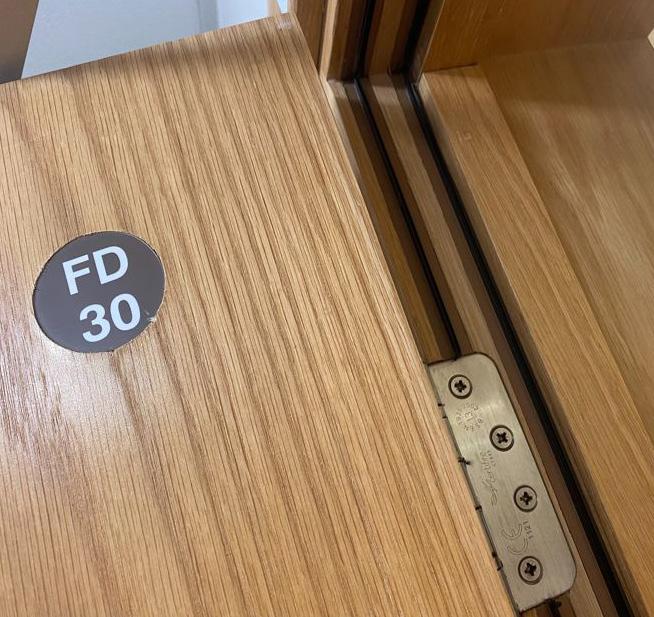

F County Durham, meanwhile, opened its doors to Woodham Academy, which benefitted from new buildings funded through the SRP.
Developed by Galliford Try, the project was designed and constructed to minimise carbon usage and features air source heat pumps, solar panels, electric vehicle (EV) charging stations, a biodiverse green roof, and several other features that will also reduce running costs.
In addition to state-of-the-art classrooms, the new buildings include a four-lane swimming pool, sports hall and fitness studio, all of which can be utilised outside of school hours by the local community.
The government has recently reported that more than half of RAAC-affected schools and colleges are either fully free of the substance or are in the process of having it removed.
Fifty two of the schools with targeted grant funding have had RAAC removed, and a further 71 schools with RAAC are in the process of being rebuilt under the School Rebuilding Programme.
Education Secretary, Bridget Phillipson, said: “High-quality classrooms show every child that their education matters – and that their future matters to this government. We are repairing the fabric of our schools and restoring the pride pupils feel in their classrooms.”
In another industry move, LocatED – the government’s school building body – will be integrated into the Department for Education by April 2026.
The integration will combine LocatED’s commercial property expertise with the Department for Education’s understanding of what schools need, whilst delivering maximum value for taxpayers.
LocatED was established in 2017 to support the delivery of education settings across England including buying, developing, and managing sites for schools and colleges as well as strategic property advice to government and education bodies to help build a more efficient education estate.
Department for Education Permanent Secretary, Susan Acland-Hood, said: “LocatED will bring commercial property expertise into the heart of the Department for Education to help us manage and transform the education estate, make it sustainable, give great value to the taxpayer, and support excellent outcomes for children and young people. I’m delighted to be welcoming LocatED colleagues even more closely into the Department.”
Lara Newman, chief executive at LocatED, added: “Both organisations will work closely together to ensure seamless continuity of all services and projects throughout the transition period.”
While rebuilding is not a quick fix, the renewed commitment from the government into the School Rebuilding Programme, as well as moving its school property company LocatED directly into its remit, the Department for Education has signaled a change in the way it approaches school infrastructure. L
BESA explores the government’s ten-year-plan for trade and industrial strategies, which covers innovation, energy, skills and trade, and aims to address the challenges facing UK manufacturers
In June, the Department for Business and Trade launched its ten-year-plans for trade and industrial strategies. This is the first time the two have been launched in tandem, a deliberate move by Business Secretary Jonathan Reynolds who has long argued that trade and industrial policy should “work hand in glove”.
The alignment seeks to address longstanding criticism that UK policy has lacked coherence. MakeUK has previously described the absence of a clear industrial strategy as the UK’s ‘Achilles heel’, while the Institute for Government has argued that fragmented approached have left businesses uncertain and undermined investment.
The challenges facing UK manufacturers are considerable. Brexit has weakened trade with the UK’s closest market, with the Office for Budget Responsibility estimating a five per cent hit to GDP. At BESA, the impact of Brexit continuing to be cited as the biggest obstacle to exporting – over five-years after the UK’s withdrawal from the European Union.
Furthermore, spiralling energy costs have added further strain with the Office for National Statistics reporting that over half of manufacturers have faced disruption to production or supply chains. Unsurprisingly, this has led some UK based manufacturers within the educational suppliers sector to move operations to the EU, where energy is cheaper and access to the single market is easier.
The Department’s new approach seeks to respond to these pressures across four key areas: innovation, energy, skills, and trade.
Two new schemes, the British Industry Supercharger and the British Industrial Competitiveness Scheme – will provide energy-intensive industries, such as those
who work with paper and pulp, with subsidies to get energy at prices more competitive with those available on the continent.
SMEs will receive further support to adopt automation and digitisation. The Made Smarter Adoption Programme will see £40m invested into Robotics Adoption Hubs, helping firms modernise production lines and boost productivity.
The Government emphasises skills as central to industrial renewal. Planned reforms include expanding Technical Excellence Colleges to address shortages in areas like engineering, manufacturing, and digital. A reformed lifelong learning entitlement will give workers more flexible access to training, replacing existing loan schemes with finance for modular study equivalent to four years of full-time education.
On trade, the most notable development is the £20bn expansion of UK Export Finance, giving SMEs greater access to guarantees, loans, and insurance. Export support services will also be modernised, while efforts are underway with the European Union to digitise trade documentation, aiming to reduce delays at borders. If successful, these measures should help UK-based manufacturers continue supplying schools and supporting jobs. The bigger test will come later this year, when the Department publishes its refreshed International Education Strategy. M
www.besa.org.uk

Poor communication around school meals is leaving families underinformed, contributing to missed entitlements and potentially poor nutritional choices. The 2025 School Meals Report reveals why bridging this communication gap is vital for pupil’s health and equity
Good communication is the backbone of any successful system – but when it comes to school meals, too many families are being left in the dark. According to the 2025 School Meals Report , produced by ParentPay Group in partnership with LACA –The School Food People, nearly half (49 per cent) of UK parents feel underinformed about what their children are eating at school.
The report, drawing insights from more than 236,000 parents, reveals a significant communication gap – one that is contributing to missed entitlements and potentially poor nutritional choices. But it also highlights a clear opportunity: by improving how schools, caterers and families share information, we can better support the pupils we all serve.
Let’s look at the three critical areas where school meal communication is falling short –and why it matters.
Free school meals: eligible but unused
One of the most pressing consequences of the communication gap is the underuse of free school meals (FSMs). Despite 25.7 per cent of UK children now qualifying, uptake lags behind. And with over 500,000 additional pupils expected to become eligible by 2026, collaboration will be essential to ensure families don’t miss out.
“The reasons are familiar but persistent. Parents may be unaware they qualify, unsure how to apply, or uncomfortable claiming FSMs due to stigma or uncertainty about meal quality. Some schools still rely on paper forms or inconsistent communication methods that make it harder for families to stay informed or feel confident opting in,” commented Phil Roberts, group chief growth officer at ParentPay Group.
“The research shows a clear disconnect between what’s on offer and what parents E
F know,” adds Judith Gregory, chair of LACA. “Improved communication isn’t just about awareness – it’s about ensuring more children benefit from nutritious meals that support their learning and wellbeing.”
Better uptake of FSMs is also tied to increased funding. When more eligible children take up free meals, schools receive additional resources they can invest back into provision and pupil support. Clear messaging can go a long way in encouraging participation.
Breakfast provision is another area with untapped potential. According to the report, 55 per cent of UK schools offer breakfast clubs, yet a third (33 per cent) of parents say their child doesn’t attend. More surprisingly, 24 per cent of parents didn’t even know if their child’s school provided a breakfast option. This matters. Breakfast clubs are proven to boost concentration, attendance and behaviour – particularly for disadvantaged pupils. Yet without clear promotion and communication, these services remain underused.
“When services like breakfast clubs go unpublicised, families miss out and so do schools,” says Roberts. “We need to make it
easier for parents to access this information in real time – not rely on word of mouth or dated letters home. We’ve seen schools implement simple push notifications or app updates that have dramatically improved breakfast club participation,” he added.
Obesity and the health agenda
Improved communication also has a vital role to play in supporting the government’s health ambitions. The NHS 10-Year Health Plan for England aims to raise the healthiest generation of children ever. Yet nearly one in four children leave primary school with obesity.
School meals are a proven tool to promote healthy eating and reduce inequality –but only if families trust and engage with what’s on offer. When asked what would encourage them to choose school meals, 19 per cent of parents cited more menu choices and less repetition, whilst 17 per cent wanted more affordable options.
“We’re at a tipping point,” says Roberts. “With rising costs and growing health concerns, we cannot afford to treat school meals

as a secondary issue. Communication is key to building confidence and increasing participation. The more families know about what’s on the menu, the more likely they are to opt in – and that helps everyone.”
Parental support for food education is also strong. Nearly 80 per cent of parents back lessons on nutrition, food origins and healthy cooking – an opportunity for schools to link classroom learning with the lunch hall experience.
“If parents see their children learning about food, it builds trust in the meal service,” adds Gregory. “It becomes part of a bigger picture – not just a menu.”
“School meal communication should start at the dinner table at home,” says Roberts. “That only happens if schools provide the tools –visual menus, meal ratings, dietary insights – so families can talk about food together.”
For families managing allergies, clarity and consistency are especially important. The report reveals a widespread desire for clearer allergen labelling, real-time updates, and easier access to meal information. That reassurance can be the difference between anxiety and peace of mind.
“Parents of children with allergies face daily uncertainty,” says Roberts. “Digital platforms can provide clear, timely updates about allergens and menu changes, but they need to be supported by consistent practices across schools. There’s a great opportunity here to improve reassurance without increasing workload.”
According to the report, more than 70 per cent of parents rated their school’s allergen management as “good” or “very good” – but nearly a third (31.8 per cent) didn’t know how their children’s school handles allergens at all. “Transparency saves lives,” says Gregory. “No parent should have to guess if their child’s lunch is safe. That’s why we’re committed to supporting our members with the tools to ensure parents are informed and their children’s allergens are well managed.”
Closing the school meal information gap doesn’t require reinventing the system. The 2025 School Meals Report outlines a practical roadmap for schools and caterers. This includes : using pre-booking systems to give families more control and sharing menus, sourcing information and allergy details online and in real time. It also includes proactively
One of the most pressing consequences of the communication gap is the underuse of free school meals. Despite 25.7 per cent of children now qualifying, uptake lags behind
promoting FSM eligibility and simplifying applications, as well as embeddimg food education into the curriculum. The roadmap also suggests setting up clear feedback channels between home and the kitchen.
“Digital tools are a powerful enabler,” says Roberts. “They allow schools and caterers to communicate clearly, receive feedback instantly, and adapt menus quickly. We’re already seeing how this improves meal uptake and parent satisfaction.”
“We see a real opportunity for schools and caterers to use tech-enabled solutions to increase visibility, share menus, and gather feedback,” he adds. “It’s not about adding workload – it’s about building a smarter, more joined-up experience for families.”
Communication at the core “School food is part of the solution to so many social challenges,” says Gregory. “But it only works if we build a shared understanding with parents. That’s how we turn school food into a valued part of school life – not just a service that’s taken or left.”
Communication has often been treated as a support function in school meal delivery. But if we’re serious about tackling food insecurity, obesity and health inequalities, it’s time to move it centre stage.
“This is more than a kitchen issue,” says Roberts. “It’s about equity, education and empowering families. We have a collective responsibility to ensure no child misses out because of a lack of information.”
The 2025 School Meals Report doesn’t just diagnose the problem – it provides a route to progress. What’s needed now is momentum. School leaders, policy makers and catering providers must work together to build a more transparent, inclusive and informed system. Because when families are informed, children eat better. And when children eat better, they do better. That’s a resolution every school leader – and caterer – can get behind. L

School catering plays a vital role in pupil wellbeing, staff satisfaction, and school culture; but deciding how best to deliver it isn’t always straightforward. Joe Parfitt, consultancy director at the Litmus Partnership explains how to manage catering, whether in-house or outsourced to a professional provider
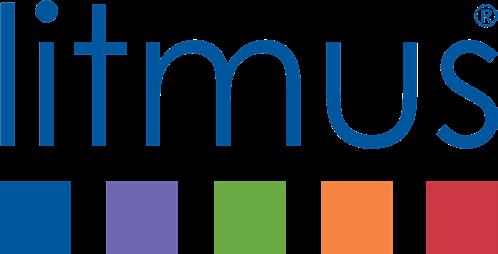
Running your catering in-house gives full control over menus, pricing, recruitment, and culture. This flexibility helps you respond quickly to pupil preferences and school events. Done well, it can be more cost-effective—avoiding contractor fees and profit margins—while integrating your catering team into the school community. However, success relies on strong leadership, sound financial management, and clear accountability. Without those, savings and standards can quickly slip.
Outsourcing can offer financial predictability, improved compliance, and access to fresh ideas—whether around menus, sustainability, marketing, or pupil engagement. Providers also manage allergens, health and safety, and shifting regulations, easing pressure on school leaders. If your school lacks time or in-house expertise, outsourcing offers specialist support and clear service standards backed by KPIs.
For in-house models, detailed financial planning is vital. Track all costs—food, labour, sundries—monitor spend closely, and adjust menus based on actual sales. If a product doesn’t sell, its margin is irrelevant—80 per cent of zero still returns nothing. Specialist procurement and catering management tools, like Litmus Edge, can reduce overall catering costs by up to 20 per cent and save up to 15 hours of kitchen admin each month.

For outsourced contracts, build in regular performance reviews to maintain standards and avoid the ‘U-shape’ dip in service midcontract. Include re-tender triggers if value drops, and explore using your provider’s apprenticeship levy to develop your team.
Whichever route you choose, invest in monitoring. Our Verify system gives you full certainty that you’re being charged correctly and the contractor is delivering on all of its tendered commitments.
Both models can deliver excellent results— the key is choosing the right one for your school and managing it with clarity and care. M
For further information on how we can help you manage your school catering email joeparfitt@litmuspartnership.co.uk


How Google’s AI assistant could save school leaders £20,000 each year and let teachers do what they do best: teach
Research reveals a staggering truth: full-time teachers in England spend over 20 hours weekly on administration, marking, lesson planning and management tasks - nearly half their working week consumed by activities that don’t directly involve teaching students. This represents a significant hidden cost: with median teaching salaries reaching just over £49,000 in 2024-2025, that non-teaching time equates to over £20,000 per teacher per year.
Now available to all UK schools and academy trusts for free, Gemini integrations in Google Workspace for Education directly targets this challenge. Rather than adding complexity, institutions can easily and intelligently support educators to safely automate some of the most time-consuming tasks, reducing the risk of burnout and empowering them to spend more time on what they enjoy: teaching.
The Department for Education previously reported that teachers are working on average around 50 hours per week, including over 12 hours during weekends. It’s no wonder, given these workloads, that more than ten per cent of teachers leave the profession just one year after qualification.
Utilising Gemini, schools are better equipped to transform workloads dramatically. Differentiated lesson plans on any topic for any level can be kickstarted through simple prompts, reducing creation time to minutes of review and customisation. Sourcing personalised reading materials and contextually relevant assessment rubrics that consider each student on their own learning journey no longer require hours of manual adaptation. Beyond the classroom, school managers and administrators are leveraging Gemini to draft communications, from policy updates to grant proposals, whilst NotebookLM and Deep Research rapidly accelerate research processes across all staff levels. ASSET Education, an early adopter of AI across their academy trust, highlighted the real-life benefits their
community are experiencing with Gemini in a video case study in partnership with Getech.
AI isn’t a means for replacing human expertise: it’s amplifying the capabilities of every educator. Teachers remain central to delivering transformational learning opportunities, but with restored capacity for relationship-building, personalised feedback and creative lesson development. Schools implementing Gemini report improved staff satisfaction scores and reduced recruitment pressures as workload stress decreases.
Becoming a Gemini trailblazer
Forward-thinking school leaders recognise that early adoption creates lasting advantages, but in today’s quick-paced environment, it can be daunting for institutions already stretched thin, in more ways than one, to appropriately develop their strategy for success with AI. Getech, Google’s #1 Premier Partner for Education in the UK and Ireland, provides comprehensive support for schools and academy trusts through their Gemini Trailblazers programme.
Participants gain practical expertise in using Gemini, Deep Research and NotebookLM whilst learning to measure impact through key indicators beyond simple yet significant cost savings. Their growing community of future-proofed educationalists creates a collaborative environment for teachers and school leaders to learn from peers facing similar challenges, further supporting every school’s goal for educational excellence.
The question isn’t whether AI will reshape education, but whether your school will lead or follow this transformation. M
As more schools adopt digital learning tools, choosing an effective strategy for device charging and management is essential—Powergistics offer simple and innovative solutions for schools of all sizes

Three common approaches—shared devices, 1:1 devices going home, and 1:1 devices staying in school—each offer unique benefits and challenges. Regardless of the model, the right storage and charging solution plays a vital role in keeping devices organised, protected, and ready to go.
Shared devices are typically managed as class sets that rotate between classrooms. This costeffective model reduces spending on devices and minimises damage since the equipment never leaves school grounds. However, it requires coordination—teachers must book carts in advance, and moving bulky trolleys can be inconvenient.
PowerGistics Towers offer a smarter, space-saving alternative to traditional charging carts. Their vertical design has a small footprint and can be wall-mounted, placed on a stand, or made mobile with a roller. Open shelving and colour-coded cable management simplify the handout and return process, saving teachers time and helping students stay on track.
1:1 devices go home: flexibility with
In this model, each student is assigned a device and a charger to take home. It promotes learning beyond the classroom and teaches responsibility, but can create daily hurdles— devices may be forgotten, damaged, or uncharged.
PowerGistics Towers help schools mitigate these disruptions by serving as central hubs for spare devices or emergency charging. Towers with fast-charging USB-C options, like the Core16 Bolt, can quickly get devices classroomready. Keeping one in the office or tech room ensures students can quickly recover from a forgotten device without losing instruction time.
Here, each student is assigned a dedicated device that stays at school. Devices are either stored in classrooms or moved with students. This model reduces breakage and ensures devices are consistently charged and available.
PowerGistics supports this model exceptionally well. Each student can be assigned a shelf, making storage intuitive and organized. Teachers gain quick visual confirmation that all devices are returned and charging. For schools building in-class charging infrastructure, PowerGistics offers a future-proof solution that’s durable, easy to use, and designed with student accountability in mind.
No single approach works for every school, but with thoughtful planning and the right tools, digital learning can thrive. M

The government has recently set out six digital standards that all schools must meet by 2030, aiming to eliminate disparities in technology access and ensure every pupil can benefit from modern, connected classrooms
The government has recently unveiled a set of six digital standards that every school and college will be expected to meet by 2030. This initiative is designed to end the postcode lottery of digital provision, ensuring that access to modern technology is no longer determined by geography or funding.
Too many children are still learning in classrooms without the digital tools required for today’s education and tomorrow’s careers. Outdated infrastructure and unreliable connectivity have prevented teachers from delivering engaging, modern lessons, and have left students ill-equipped for an increasingly digital world. The government’s
new standards aim to change that, by setting clear expectations around digital infrastructure, online safety, and leadership. These standards cover broadband internet access, wireless networks, and network switches – all essential for ensuring that schools can support a reliable digital learning environment. But the plan goes beyond technology itself. Schools are also expected to demonstrate strong digital leadership and governance, with senior leaders taking responsibility for technology strategy and implementation.
Crucially, online safety is central to the framework. With the increasing use of digital tools in the classroom, schools must also E


F implement robust cyber security systems, along with filtering and monitoring solutions to protect pupils from harmful online content and threats.
To support schools on this journey, the Department for Education is expanding its Plan Technology for Your School service. This free tool is designed to help schools assess their current digital setup, understand their unique needs, and develop cost-effective, future-focused strategies. By offering tailored recommendations and expert guidance, the service allows school leaders to make informed decisions that align with national standards and best practices.
Lara
le Court de Billot, senior policy advisor in the Department’s School Technology Services
Outdated infrastructure and unreliable connectivity have prevented teachers from delivering engaging, modern lessons, and have left students ill-equipped for an increasingly digital world. The government’s new standards aim to change that


team, explains that the service was created in collaboration with school leaders and technical experts. It supports schools in creating strong digital strategies that not only improve teaching and learning but also reduce staff workload, improve efficiency, and help schools get better value from suppliers. She said: “The ‘Plan Technology for your School’ service supports schools in creating and developing lasting digital strategies that align with best practices and meet the Department for Education’s digital and technology standards.”
The government has backed this policy with a £45 million investment this year to improve school infrastructure, particularly in areas where it is needed most. This funding will go towards upgrading broadband and wireless networks, bringing classrooms online, and helping to ensure a consistent standard

of digital provision across the country. It builds on the success of the Connect the Classroom programme, which has already improved digital access for more than 1.3 million pupils across 3,700 schools.
Further education colleges are also part of the plan. Jisc – the UK’s national education and research network provider – will continue to support colleges with expert advice and access to the high-speed Janet network.
Minister for Early Education, Stephen Morgan, emphasised the importance of this investment. “Every child deserves access to the digital tools that will prepare them for the modern world, regardless of which school they attend. For too long, we’ve seen a postcode lottery where some pupils thrive with cutting-edge technology whilst others are held back by outdated equipment.”
He added that this initiative is a key part of the government’s wider Plan for
Change, which aims to ensure every child has the opportunity to succeed, with no pupil left behind in the digital age.
The first standard focuses on broadband internet, requiring schools to have a full fibre connection to their broadband service at the speed needed for effective online learning tools.
Primary schools should have a minimum of 100Mbps download speed and a minimum of 30Mbps upload speed. Secondary schools, allthrough schools and further education colleges should have a connection with the capacity to deliver 1Gbps download and upload speed.
Building on that, the second standard addresses wireless networks. As schools and colleges will have a high number of users accessing the network at the same time, a high-performance solution will make sure that the speed and management of data E

F transferred around the wireless network is resilient, efficient and secure.
Schools should use a wireless solution that uses, at a minimum, the Wi-Fi 6E standard, and it’s important to make sure there is strong signal coverage in all areas of your school or college where mobile devices are to be used.
To support this connectivity, the third standard requires schools to install and maintain high-performing network switches. These are the backbone of any school’s digital infrastructure, managing data flow between devices and keeping the system running smoothly even under heavy use.
Beyond the technical infrastructure, the fourth standard focuses on digital leadership and governance. Schools must have clear strategies in place for how technology is integrated, maintained and used for learning. This includes leadership teams who understand the role of digital tools in education and can oversee their effective and responsible implementation.
Safety is also a major priority. The fifth standard mandates the use of filtering and monitoring systems to help protect pupils online. These tools are designed to block access to harmful content and enable schools to monitor internet use, ensuring that students can explore the digital world in a safe, age-appropriate environment.
Finally, the sixth standard highlights the importance of cyber security. As schools become more connected, they must also protect themselves from growing digital

threats. This means putting robust systems in place to guard against cyberattacks, data breaches, and other risks, safeguarding both staff and pupil information.
Together, these six standards form a comprehensive framework for digital readiness, giving schools the foundation they need to deliver high-quality, safe and future-proof education.
As the 2030 deadline approaches, the challenge now lies in ensuring that all schools - urban or rural, large or small - are equipped to meet the standards. L

We’re more than just a supplier— we’re your full-service office & education partner
MPS UK Group believe that the right environment transforms how people work, teach, and learn. That’s why they go beyond just supplying products. MPS UK deliver complete, tailored solutions across furniture, technology, and support services, designed to meet the unique needs of every setting, from schools to busy offices and community spaces
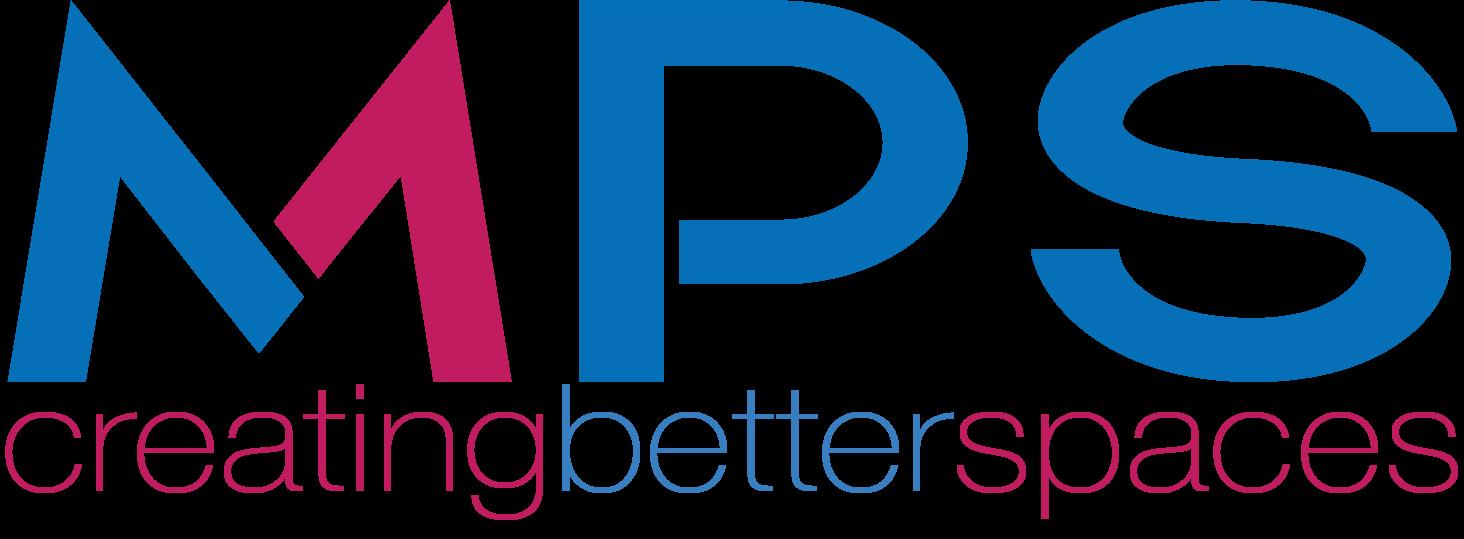
Supporting SEND with adaptive, specialist solutions
We understand two learning environments are not the same, especially in the world of special educational needs and disabilities (SEND). Supporting pupils with additional needs requires more than good intentions. It demands care, flexibility, and a deep understanding of how space, design, and resources affect wellbeing and learning outcomes. That’s why we take a personal, hands-on approach. We work directly with SEND schools across the UK to deliver specialist furniture, adaptive learning resources, and inclusive design solutions that create safe, calming, and functional spaces.
Our journey began in the educational sector, supplying schools with quality furniture and classroom essentials. But as our relationships grew, so did our services. Today, we offer everything from office and classroom furniture, stationery, and janitorial supplies to full workspace fit-outs, backed by our inhouse space planning who design ergonomic, inspiring environments tailored to your needs.
What sets us apart is simple: we genuinely care. We know how demanding education and support environments can be, so we focus on making life easier for you. With fast delivery across much of the UK and a reputation for friendly, reliable service, we’ve built long-term partnerships with schools, academies, and specialist provisions that trust us to get it right the first time.
We also aim to remove the stress of dealing with multiple vendors. With one point of contact and a flexible, solution-focused team, we’re here to support you in building the best possible spaces for learning and wellbeing.
So if you’re looking for a supplier who understands your challenges and delivers what you need, when you need it you’ve just found your team.
At MPS UK Group, we’re proud to be more than just a supplier. We’re a dependable partner who listens, adapts, and delivers because we know that in education, there’s no such thing as one-size-fits-all. M


Schools are turning to phone pouches in order to balance digital literacy with focus and safe learning environments

Smartphone use is now nearly universal among teenagers, and feedback from schools is students will try their best to work around imposed phone bans, with frequent toilet breaks a particular favourite.
While traditional bans often lead to conflict, inconsistency, and lost learning time, many schools are now exploring a simpler, more effective alternative: lockable phone pouches. This solution allows students to keep their phones on them, but locked away and inaccessible until the end of the day or lesson. The result is a subtle shift that’s delivering real change. Teachers report stronger attention and classroom engagement. Students are more present and sociable. Behaviour improves. Conversations flourish again during breaktimes.
Unlike confiscation, this approach avoids confrontation. With phones locked away, the temptation to check messages or scroll social media disappears, and so too does the need for staff to constantly police device use.
Students quickly adapt to the routine, and for many schools, this has brought a measurable shift in school culture.
The wellbeing benefits are also striking. By reducing screen time during the day, schools are seeing students become less anxious, more focused, and more engaged in realworld interactions. Families involved in pilot programmes have noticed the difference too -

some parents describing the change as “getting their child back.”
Jemma Arnold-Gunning from the Insignis Academy Trust commented on their implementation of the popular Phone Locker® pouches, saying; “The results have been overwhelmingly positive seeing a vast improvement in student engagement, focus, improved behaviour, less bullying incidents to name a few.”
Implementation is flexible. Some schools choose to phase the pouches in gradually, while others introduce them across year groups all at once. Different models are available to suit varying school policies, including options for students who need access to health-related apps. Support is usually available for rollout, including staff training and policy advice, and some schools even customise the pouches with their own colours or logos.
From large academy trusts to individual secondary schools, the feedback suggests pouches help regain valuable teaching time and restoring a sense of calm and connection across the school day. For schools currently reviewing mobile phone policies, this approach offers a balanced and proven way forward.
To explore how the system could work in your school, visit us below. M
Hit the ground running this academic year by stocking up on the essential supplies your educational setting needs. From classrooms to staff rooms and communal areas - make sure everything’s ready from the get go!
Equip learning spaces with classroom supplies, tech and whiteboards. Keep staff areas well-stocked and comfortable for breaks, lesson prep, or marking. And ensure the admin office is organised and efficient with reliable printing and mailing supplies.
Set off on the right foot and stock up on:
✓ Pens, pencils, and exercise books
Everyday teaching essentials that support structured learning and pupil engagement
✓ Teas, coffees, biscuits & kitchen equipment
Keep staff energised and comfortable with a well-stocked break space
✓ Academic diaries, planners & whiteboards
Help your team stay organised, focused, and in control of their schedules
Don’t forget to check out our Viking branded products –great quality, at a great price - helping your budget go further all year round.
Viking is your go-to for;
���� Office stationery and electronics
� Cleaning and janitorial supplies
� Office, classroom and communal area furniture
���� Facilities and grounds maintenance tools
� Safety signage, First aid kits and PPE
With over 48,000 products online and free next-day delivery, we have everything your education facility needs to get set for success!




With the new academic year underway, now is the perfect time to review your supplies and ensure every area of your education setting is ready for a productive year ahead.
With over 35 years’ experience supporting schools, colleges, and multi-site facilities, we offer a comprehensive range of products tailored to the needs of teaching and support teams alike. Our solutions help manage budgets, save time, ease workloads, and create positive environments to keep your entire site running smoothly.
From everyday essentials to expert servicesall in one place
Provide engaging learning environments with a wide selection of classroom supplies, including stationery, exercise books, tech, furniture, and whiteboards. Create welcoming, well-equipped staff rooms stocked with catering supplies, appliances, and casual seating - giving your team space to recharge, plan, and connect.
In the school office, streamline admin tasks with printers, ink, planners, filing solutions and mailing supplies. We also offer a bespoke, web-based print service for bound and unbound materials - perfect for school reports, governor packs and Ofsted preparation.
If you're planning a refurbishment, our specialist interiors and furniture service is here to help. From concept and space planning to full installation, we manage the process and deliver everything you need to make learning and working spaces fully functional and fit for purpose.
To maintain clean, safe and compliant environments, we also supply a full range of cleaning and janitorial products, as well as tools and equipment for building and grounds maintenance.
Viking Brand – value without compromise
Our exclusive own-brand range offers excellent quality at a lower cost, making it easier to stretch your budget across multiple product categories. Designed to match or exceed the performance of big-name brands, it’s the ideal choice for education settings managing rising costs.
Sustainable, greener options
Choose from an extensive range of eco-conscious products - from re-manufactured ink cartridges and FSC-certified paper, to Fairtrade refreshments and ecofriendly cleaning solutions. These choices help you meet environmental goals and support responsible sourcing.
With over 48,000 products in stock and free next-day delivery, whether you choose to purchase independently or via one of the approved OJEU-compliant frameworkssourcing what you need has never been easier.
To find everything you need to support a successful academic year visit viking-direct.co.uk
Quote VGB-Educationat checkout for a 15% discount on orders of £89 or more*










The UK Home Office has rolled out major reforms to Child Student visa rules, effective from the 29th of May 2025. These changes aim to enhance safeguarding but increase the compliance burden for families and schools. Key updates include stricter definitions and responsibilities for nominated guardians, who must now provide detailed letters of undertaking, including household members’ details. Applications can be refused based on carers or cohabitants’ criminal history.
New living arrangement rules mandate that students must reside with a parent, approved carer, or in full boarding, with clear consent documentation. The Home Office also introduced enhanced due diligence for sponsors, requiring schools to record travel and accommodation plans for each pupil. Michelle Holmes, MD at Holmes & Partners, warns: “While the rules clarify guardianship standards, they pose real administrative challenges. Schools must act fast to avoid delays or refusals.”
To stay compliant, schools should review safeguarding procedures, collect key documents early, and ensure staff understand the changes. For guidance, visit UKVI’s sponsor duties or contact Holmes & Partners for tailored support. M

With thousands of new school-based nursery places created and more government funding on the way, we meet some of the schools that have taken up the offer – and find out what advice they would share
This September, 189 new or expanded schoolbased nurseries opened their doors across England, creating over 4,000 additional childcare places for children, thanks to the government’s funding scheme designed to support nurseries on school sites.
With momentum building, the Department for Education is now inviting schools to bid for the second phase of funding. From a £45 million pot, successful applicants could receive up to £150,000 each to open or expand nurseries by September 2026. The aim is to deliver a further 300 new or improved nursery settings, offering up to 7,000 additional places. This next phase will prioritise highquality bids from schools in disadvantaged communities, ensuring support reaches those who need it most.
Early years on school sites: why it matters At the heart of this initiative is a national effort to tackle the growing school readiness gap. Findings from Kindred’s 2024 School Readiness Survey revealed that nearly one in three Reception-aged children struggle to communicate basic needs, and a quarter lack foundational language skills – barriers that can have a lasting impact on learning. By co-locating nurseries within school settings, leaders and policymakers hope to foster better alignment between early years and primary education. The benefits are significant: greater continuity of care, earlier identification of SEND needs, and smoother transitions into Reception. For children, it’s a more stable and familiar experience; for schools, it provides a powerful opportunity E
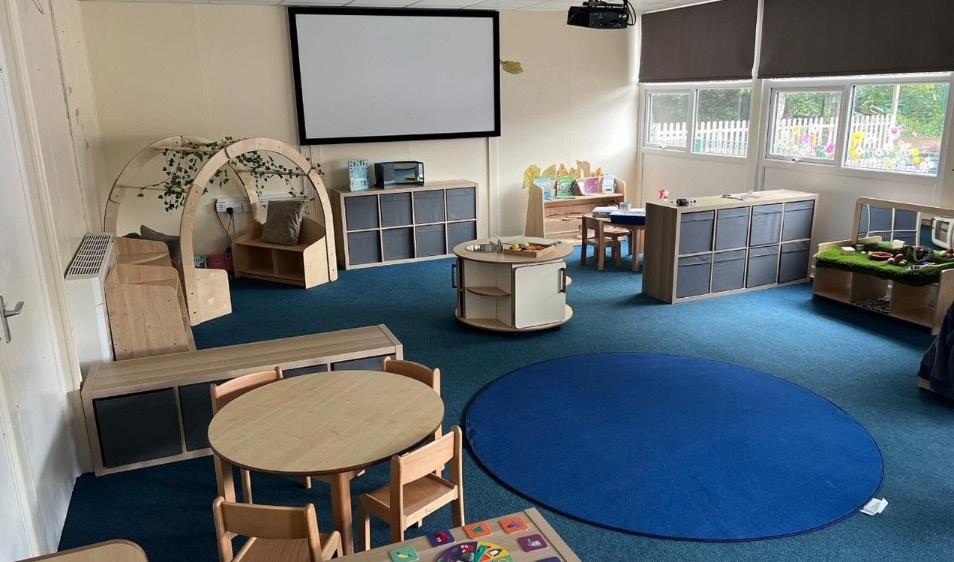

F to engage with families from a child’s earliest years.
“Being based on a school site means children can settle in early, build confidence, and feel ready for the step into Reception,” says Wayne Wathen-Howell, headteacher at Minet Infant and Nursery School in Hayes, one of nearly 200 schools opening new nursery places this term. “It’s a big moment for our community.”
The scheme also offers much-needed relief for parents facing rising childcare costs. When paired with the government’s 30-hours free childcare offer, families can save up to £7,500 per year. The convenience of having siblings on the same site, combined with the assurance of continuity through to Year 6, makes the schoolbased model an increasingly attractive option.
For schools, the benefits go beyond pedagogy. Early years provision can strengthen community ties, raise a school’s profile, and support Reception enrolment.
From concept to classroom
Cinnamon Brow C of E Primary School is one example of how schools are using the funding to meet community needs creatively. In partnership with PVI provider Let’s Be Kids, the school is has opened 15 new nursery places for children from nine months old, repurposing
a previously unused classroom and offering wraparound care from early morning until 6pm.
“Applying for the government funding was a no-brainer,” says headteacher Rachel Pimblett. “We have families from all circumstances and backgrounds at our school, and it’s so important to us to be able to support each and every one of them as much as we can.
“With the new nursery, children get more consistency because they’re able to be here with their siblings from their earliest years all the way up to age 11, and offering childcare around the school day is a huge help for working parents.”
St John’s Church of England Primary School in Lancashire opened its nursery in September 2025 after receiving the Schoolbased Nursery Capital Grant. As the only local primary school without a nursery, the team at St John’s had the ambition, but not the capital – to make it happen. The grant allowed them to transform underused space into a 30-place nursery for three and four year-olds, offering a flexible model to meet local needs.
Headteacher and governors were deliberate in their approach: consulting families through Facebook surveys, seeking advice from other schools, and working closely with the local authority’s early years team. Staffing was a major focus, and the school was fortunate to recruit experienced EYFS professionals.
The
next phase will prioritise high-quality bids from schools in disadvantaged communities, ensuring support reaches those who need it most
“The process was like launching a new business,” the school reflects. “It takes time to build up numbers and income. We learnt the importance of early consultation, budgeting for hidden costs and having a supportive governing body.”
Yohden Primary School in County Durham also seized the opportunity to address a local shortage of nursery places. Their new nursery will open in 2025 with 23 full-time places for two, three and four year-olds.
The school worked thoroughly, securing landlord permissions, arranging builders and gathering quotes before submitting the application. “Community feedback confirmed the need and the grant enabled us to act on it,” the school reflects.

The EYFS lead transitioned from Reception to lead the nursery, supported by a skilled assistant. Marketing efforts included progress updates on social media and plans for a September launch event.
For schools considering a bid, the message from those already on the journey is clear: start early, engage your governors, and plan for the unexpected. Early consultation with families and stakeholders not only strengthens your application but builds community support and ensures the nursery reflects local needs.
Headteachers who have successfully navigated the process emphasise the importance of tapping into local authority support, learning from peer schools, and accessing national guidance such as DfE webinars and EYFS training materials.
As the scheme expands into its second phase, the momentum behind school-based nurseries continues to grow, offering benefits to schools, children and working families. L

Damp and mould have a number of root causes hence any singular improvement has not always been successful, and a refined approach is a key consideration for these annual problems.
Recognising a drive to insulate our leaky buildings and improve their carbon footprint is underway, if we sought to implement such recognised aspects in school buildings today ahead of a
defined understanding of the structure and its current installed atmospheric management, the problems could significantly escalate in absence of understanding.
Having witnessed repeat problems for a host of clients, Cornerstone believe a uniform framework is a key deliverable to uphold tailored approaches to such reported problems. Why? Because we are passionate about protecting the health of all schoolchildren and associated teaching personnel when at a place of learning.
Whether it is indeed a classroom, hospital ward, office or bedroom, SMART knowledge delivered via our accredited CPD damp, condensation, mould and ventilation training embraces all room types and recognises mould is a ‘symptom’ of a problem with associated credible solutions to underpin confidence via a ‘did you know’ approach. M
FURTHER INFORMATION
www.propertyhealth.co.uk
0344 846 0955

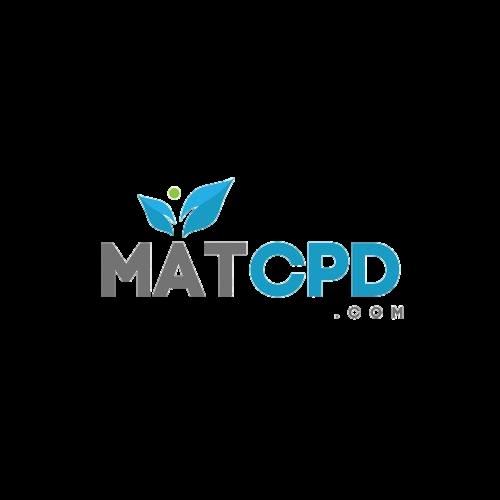




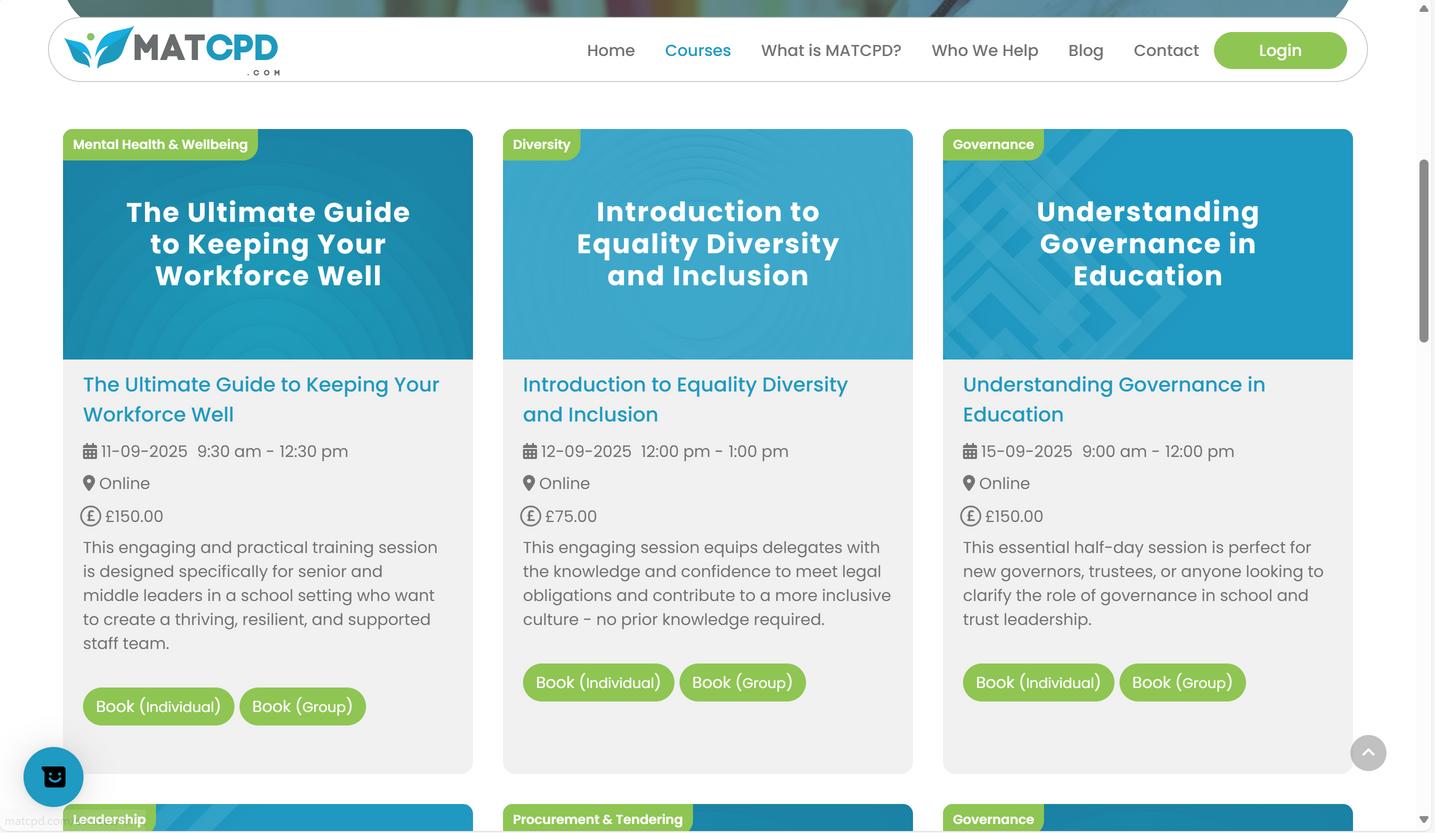


The education sector is changing —and so must we.
As multi-academy tr usts grow and mature, leader s are faced with pressing questions around gover nance, leader ship, sustainability, and strategic scale.
Shaping the Str ucture of the MAT Sector to 2030—a forwardthinking white paper packed with exper t insight and practical guidance to help you prepare for what’s next. DOWNLOAD →











The new recycling regulations, which came into force in March 2025, mean schools must review their waste management practices to ensure compliance. From separating food waste to reducing landfill, the changes offer a valuable opportunity for schools to engage in greener and more efficient waste management practices
From 31 March 2025, new recycling regulations came into force which apply to schools across England. These changes present not only a legal obligation but also an opportunity for schools to reassess their entire approach to waste management – ensuring compliance, improving efficiency and advancing sustainability goals.
The updated regulations aim to simplify and standardise recycling nationwide, replacing the previous patchwork of local rules with a single, unified system. Whether at home, work, or school, the same materials will now be collected, helping to remove confusion and encourage better recycling habits across the board.
For schools, this means ensuring food waste and general waste are separated from dry recyclable materials – if they’re not already. Dry
recyclables include paper, cardboard, plastic, metal, and glass, which can all now go into one mixed recycling container. Food waste, however, must be placed in a dedicated food waste bin.
To comply with the new rules, most schools will need at least three separate waste containers: one for general waste, one for food waste, and one for mixed dry recyclables. While garden waste and plastic film are currently excluded from the regulations, schools should still consider how best to manage them.
Schools should ensure they have enough bins for each waste stream. Bins should be clearly labelled and colour-coded to make it easy for both pupils and staff to dispose of waste correctly. E
F It’s equally important to raise awareness throughout the school community. Clear signage, visual guides, and age-appropriate communication can help ensure everyone understands what goes where, and why recycling properly matters.
Even if a school already separates food waste, existing practices should still be reviewed to confirm they meet the new requirements. Schools must also check that their waste contractors and licensed carriers are compliant with the updated regulations. These changes not only help schools meet legal obligations, but also contribute to wider environmental and financial goals by increasing recycling rates and reducing landfill waste.
Schools must also be aware that old electronic equipment, such as laptops, printers, and servers, should never be sent to landfill. Under the WEEE (Waste Electrical and Electronic Equipment) directive, educational establishments are required to dispose of electrical waste responsibly. Improper disposal also poses a data security risk, particularly if devices haven’t been wiped properly. Instead, schools should use authorised recycling services, or explore donating or selling functioning equipment to extend its lifespan and reduce waste.
The introduction of new regulations is the perfect time for schools to carry out

To comply with the new rules, most schools will need at least three separate waste containers: one for general waste, one for food waste, and one for mixed dry recyclables
a waste management audit. This should begin with understanding the types and quantities of waste produced across the school site. While it may be unglamorous work, a quick examination of what’s actually in the bins can provide valuable insights. Schools should assess whether bins are appropriately placed and if collections are scheduled frequently enough, or too often. Reviewing bin fullness and collection costs can highlight areas where adjustments might lead to savings.
Another key focus should be waste reduction. Simple changes like reducing paper usage, moving to digital communications, and limiting printing can significantly cut waste. Schools can also consider banning single-use plastics, such as straws, bags, bottles, and disposable food packaging, to drive down plastic waste. Food waste is another critical area. According to national estimates, schools generate over 55,000 tonnes of food waste each year. By analysing which items are regularly discarded, catering teams can reduce portion sizes, remove unpopular meals, and potentially implement a pre-ordering system where pupils or parents choose meals in advance. Some schools may also explore food-sharing schemes to ensure edible surplus food doesn’t go to waste.

The new recycling regulations are more than just another compliance checklist, they’re an opportunity for schools to become greener, more efficient and more cost-effective. By reviewing waste management processes now, schools can ensure they’re not only compliant, but are also making smart, sustainable choices that benefit pupils, the environment and the school’s bottom line. M
Held on 29th–30th September 2025 at Radisson Hotel & Conference Centre, London Heathrow, the Education Forum is not your average event— it’s an exclusive, two-day experience built for senior education professionals and procurement leads who are ready to drive change, discover innovation, and build strategic partnerships


Using our award-winning one-to-one meetings format, the event matches buyers and suppliers in a relaxed, businessfocused environment designed to spark real conversations and real results. Think of it as corporate “speed dating”—but with purpose.
Over two packed days, you’ll meet suppliers offering fresh solutions for your current and upcoming challenges; attend insightful seminars on hot topics in the education space; expand your network with like-minded professionals; and enjoy a complimentary overnight stay, dinner, and allday networking.
Attendance is completely free for qualifying delegates—just secure your place here.
Are you ready to meet the decision-makers shaping the future of education?
The Forum puts you face-to-face with senior-level buyers who are actively looking for products, services, and solutions like yours.

Our all-inclusive packages are built to take care of everything - so you can focus on what you do best.
What you’ll benefit from
You will benefit from a personalised itinerary connecting you directly with buyers who are actively sourcing new solutions; face-to-face time with pre-qualified senior buyers; highimpact brand exposure across pre-event marketing, social media, and our official event guide and website; your own pre-built, hasslefree meeting stand—no set-up, no stress, we handle all logistics; and a hassle-free, allinclusive experience. We organise everything for you from start to finish. M
Get more info on supplier packages by contacting Jake Healy at j.healy@ forumevents.co.uk, call 01992 374067 or visit https://education-forum.co.uk to learn more.



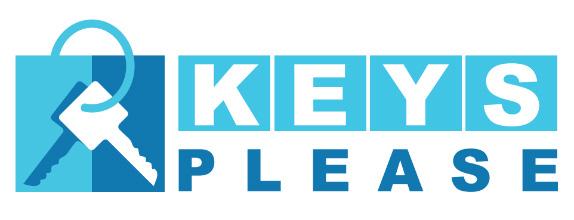




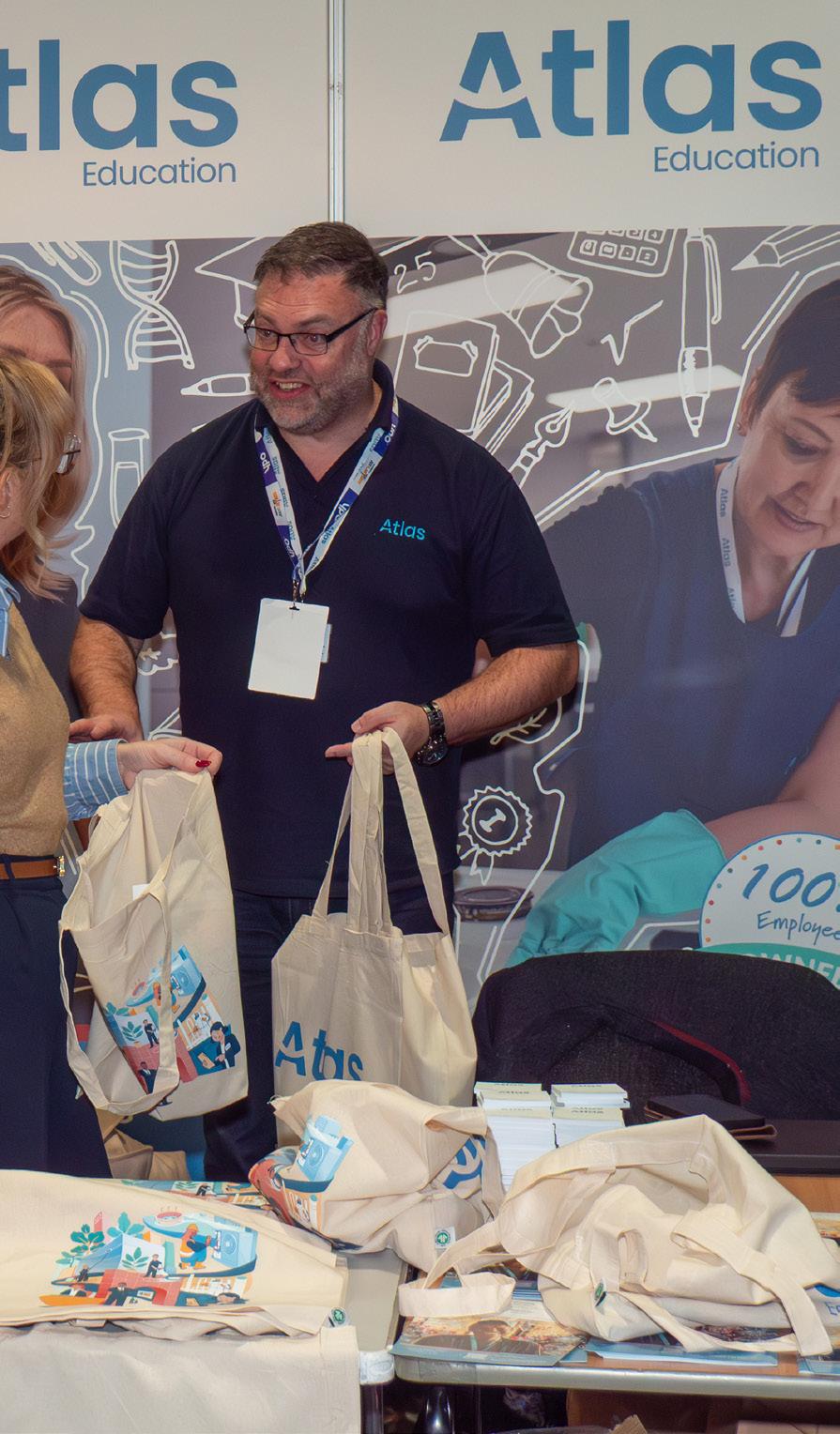

OLD BILLINGSGATE, LONDON
• Access the tools, technologies and strategies so your school or academy can thrive.
• Discover practical solutions from an inspirational line-up of educationalists and policymakers.





Schools lose thousands of pounds every year replacing lost, faulty and stolen equipment. Selectamark Security Systems helps protect and track your ICT equipment including PCs, laptops, tablets, iPads and projectors.

Asset and security labels uniquely identify assets and keep track of them within an organisation
Wide range of labels that come in various secure ratings
Can be personalised to your organisation with name, logo and sequential barcode

Forensic Property Marking Kits mark assets with a uniquely coded synthetic DNA solution
No annual licence fees and Police and insurance approved
Proven to reduce theft and burglaries by up to 83% and convict criminals
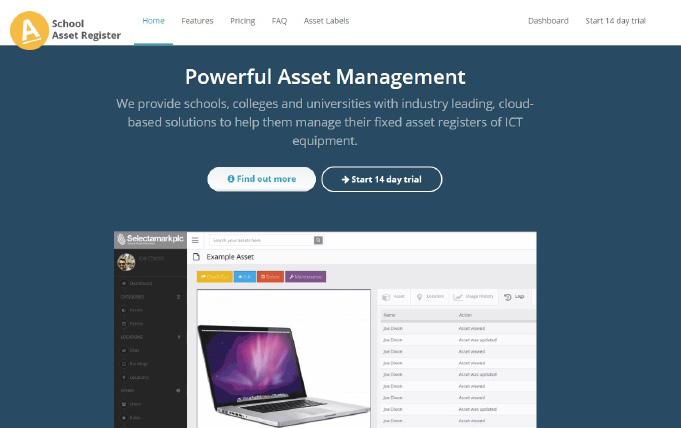
Industry leading, cloud-based solution to enable you to manage your fixed asset register
Identifies when crucial testing is needed
Assists with compliance of SFVS and complies with the DfE guidance on keeping an asset register Call us today and mention code ‘EDUCATIONTODAY10’ to get 10%





































































The UK’s leading minibus supplier, with over 20 years of experience in designing and building high-quality, customisable minibuses to meet your specific needs.
Schools lose thousands of pounds every year replacing lost, faulty and stolen equipment. Selectamark Security Systems helps protect and track your ICT equipment including PCs, laptops, tablets, iPads and projectors.


Asset and security labels uniquely identify assets and keep track of them within an organisation
Wide range of labels that come in various secure ratings
Can be personalised to your organisation with name, logo and sequential barcode







Call us today and mention code ‘EDUCATIONTODAY10’ to get 10% off SelectaLabel and SelectaDNA property marking kits. Offer ends 31st December 2025.




